
|
Our drives around the Yemen
November 1997
|
| Motoring with Mohammed - our route from Sanaa to Aden
and Wadi Hadramout with various side trips. |
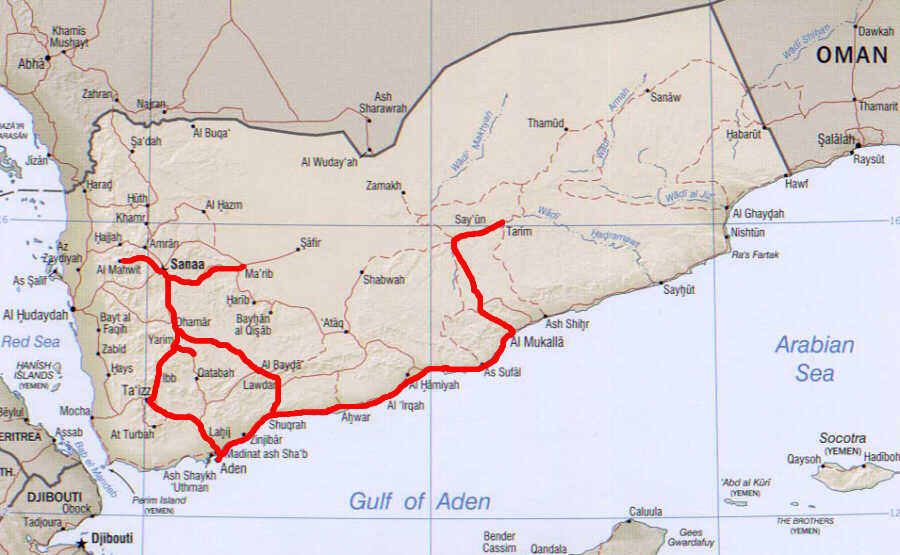
|
Part 1 - Sanaa
and day trips to wadis and villages
|
| Tues 18th. After our visit to Damascus and the Lebanon
(click the link at the bottom of the page to read about that one) we flew
to Sanaa by Syrian Arab airlines. It was all very straightforward at the
airport - we changed some money at the bank, asked an airport official about
hotels and he said if you don't want the Taj Sheeba at $200 a night try the
Sam City, and don't pay the taxi more than 600 Yemeni Riyals (about $5).
We got a taxi to the Sam City Hotel which at $35 ($40 with a $5 discount
for IBM employees!) was more in our price range, so we checked in after a
bit of hassle with the taxi driver who of course wanted more money. We set
off for a walk round Sanaa, stopping at the Al Ikwah hotel, which at 1500
YR ($12) was even more in our price range so we booked it for tomorrow. We
entered the old city through the gate in the city wall. It was like passing
through a time warp and apart from the occasional Toyota pickup you could
have moved back several centuries. |
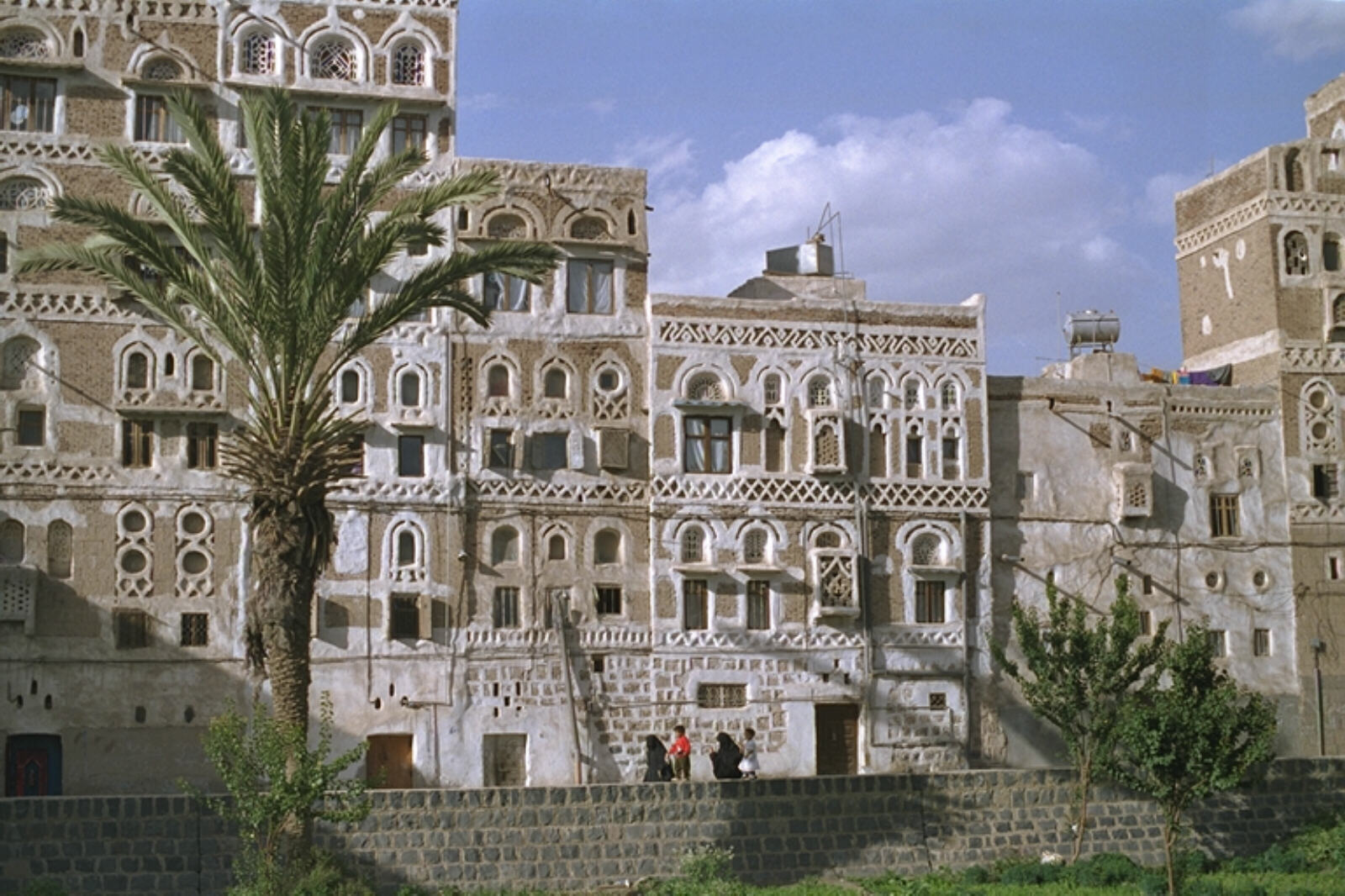
|
| Inside one doorway was a camel tethered to a grinding
machine which ground up some sort of seeds into an oil which apparently you
put on your hair to make it shine or on your chest because it's good for
coughs. The souks (markets) are even more seething and fascinating than Damascus
- a completely different world. We went to have a look at the Old Sanaa Palace
hotel, one of the old converted tower houses in the middle of the old city.
We were so impressed with the place and the charming manager and the special
price just for us because he likes the British and he's been to Guildford,
of 2000 YR ($15) that we booked it for tomorrow. We have now booked three
hotels in one day. We went on a spending spree in the souk - bought joss
sticks (in case of smelly bathrooms), little incense burners and what we
thought was incense but it doesn't burn on its own so we're not sure what
to do with it. |
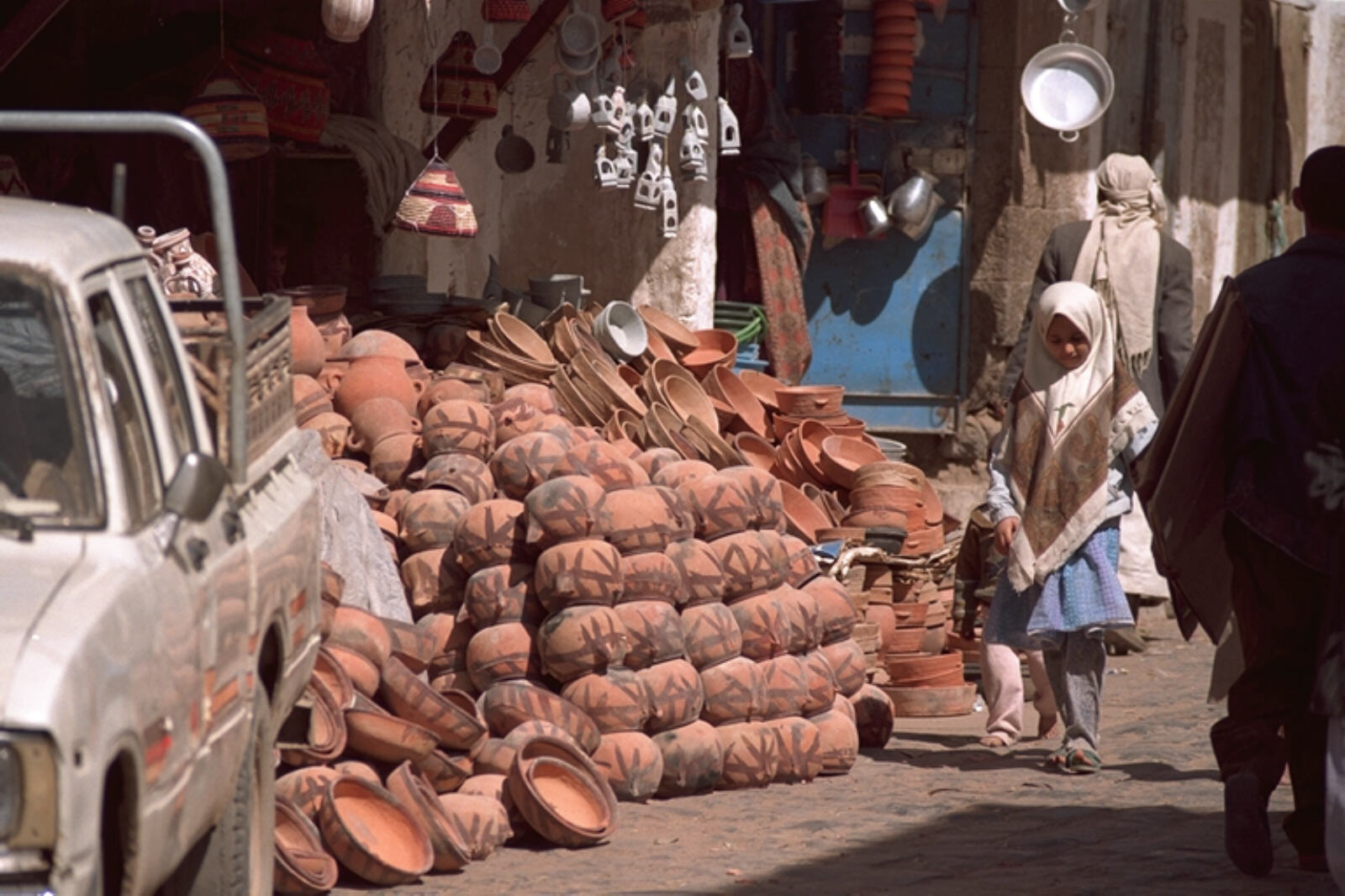
|
We almost changed some money at 140 to the dollar with
a moneychanger on the street when two Frenchmen came up and warned us that
the same man had cheated them by switching 'wads' of notes after they'd counted
them - a trick we'd not heard of before. So we went to one of the many proper
exchange shops and changed at a safe 132 to the dollar, still better than
the bank's 120-odd. We stopped for dinner at Shazarwan Restaurant on Ali
Abdul Mogni street, the 'main' street with many of the hotels and restaurants.
Had grilled chicken (half a chicken each) sprinkled with spices and very
tasty, chips, a can of Mirinda and a couple of cups of tea - excellent dinner
for 800 YR ($6) plus 100 YR for 'service' that the waiter asked for which
was a bit cheeky but he had a friendly smile. We're thoroughly impressed
with Sanaa so far!
Wed 19th. We transferred from the Sam City hotel to the Old Sanaa Palace
hotel and in the process acquired a driver to take us round the rest of the
Yemen. The taxi driver, Mohammed, had a book of impressive recommendations
and he chose a very long way round to the hotel to give us time to read them.
Then the manager at the Old Sanaa Palace knew him and said he was good, so
they worked out our itinerary for the next three days and the deal was sealed.
Our room at the OSP, number 401, was small but light and airy with views
of the square. At night the moon shone through the stained glass window in
a variety of colours. We spent the rest of the morning walking round the
old city. Down to Bab al Yaman, up through the souks, over to the fortress
and back through the back streets. Every step full of fascinating sights
and sounds. In the heat of the afternoon we retired to the mafradj, a 'lounge'
on the top floor of the hotel which is arranged with cushions around the
walls .... |
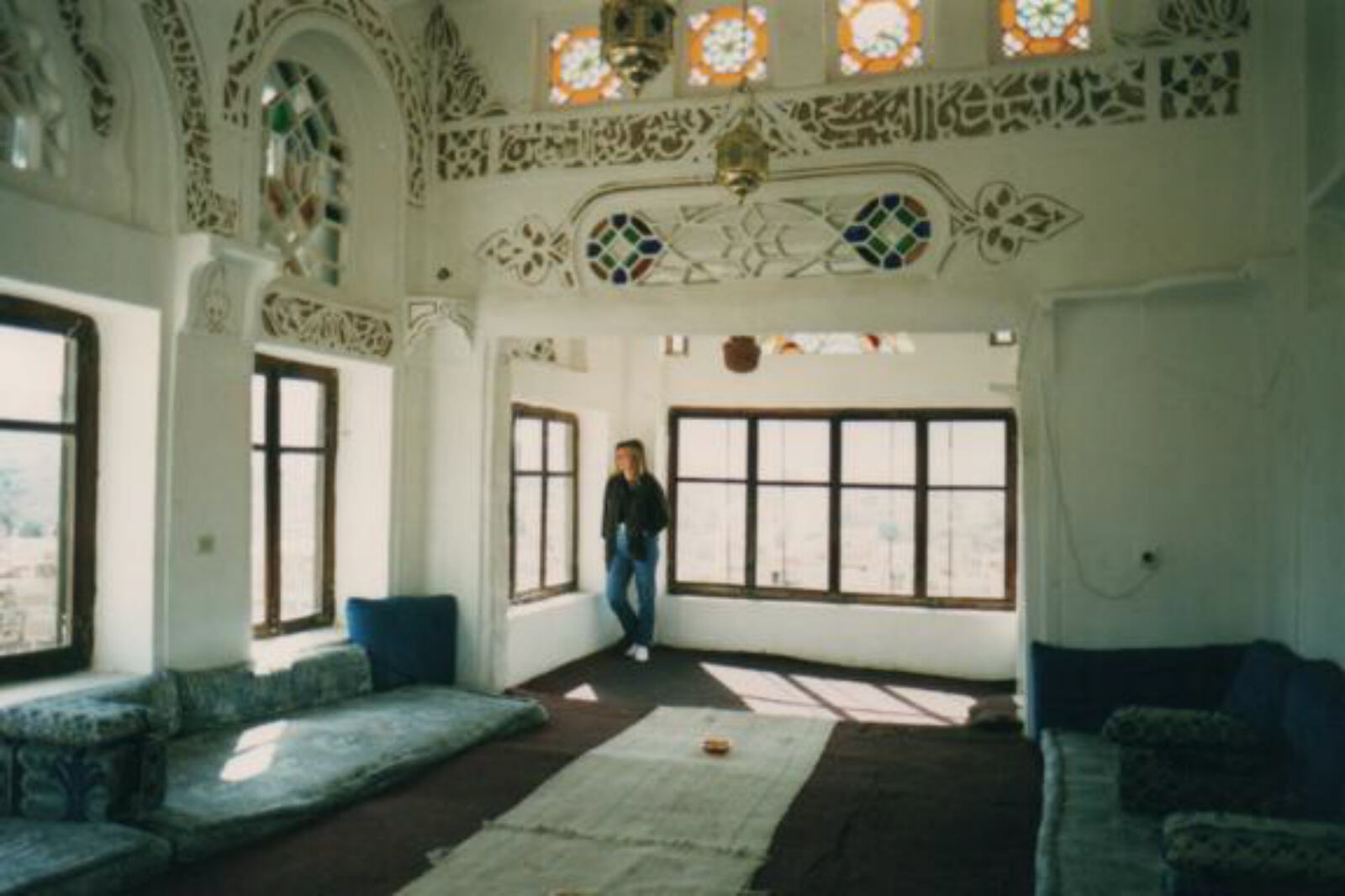
|
| .... and large windows for soothing breezes and spectacular
views over the city. Had a leisurely tea and lemon juice. |
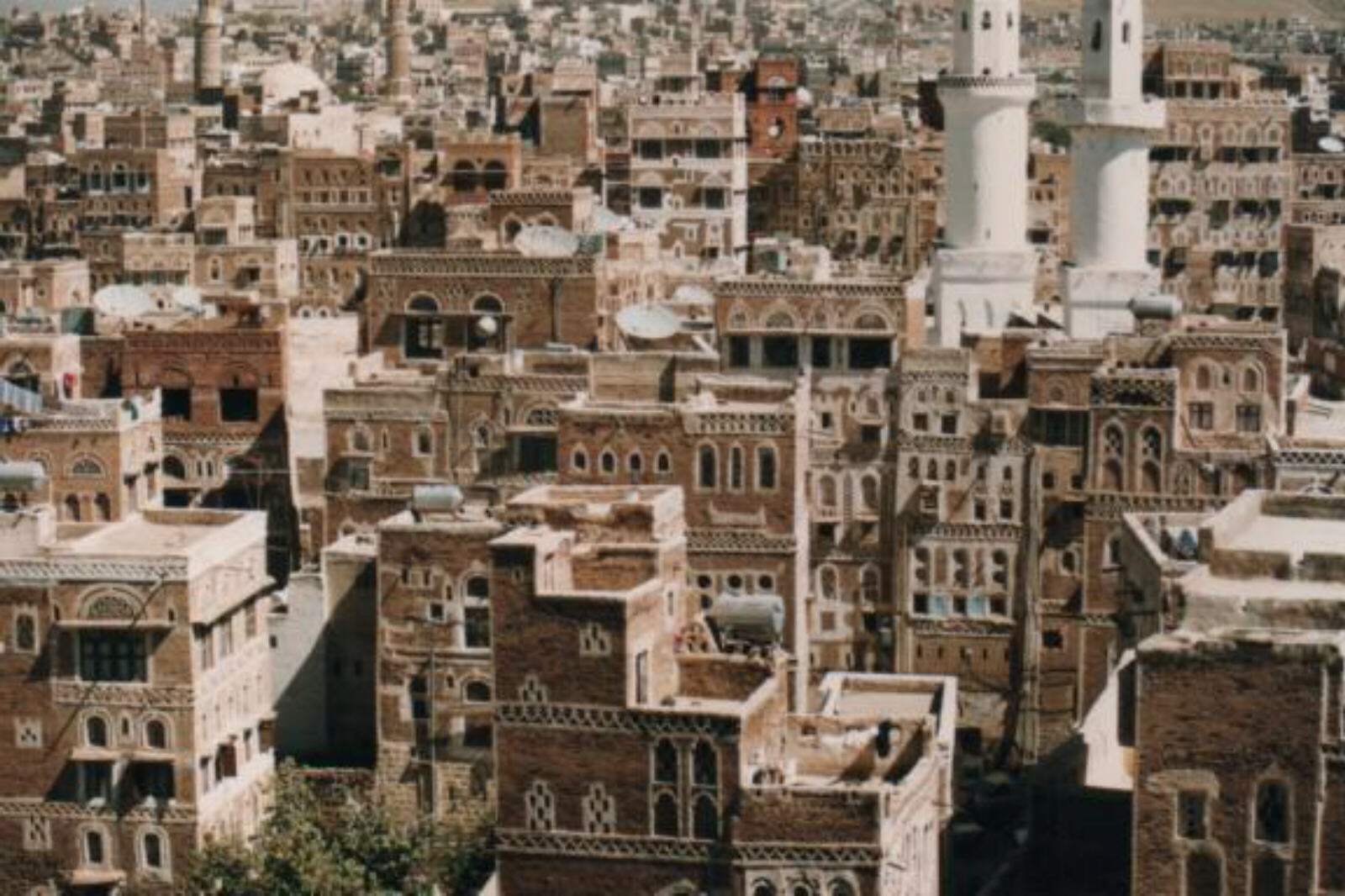
|
Then while Sheila had a nap I had another walk, starting
with the Al Ikwah hotel that we'd also booked for tonight, to cancel it.
Then up to Tahrir Square in the more modern part of town and back across
the wadi into the old city. For our evening promenade we wandered through
the souks again, avoiding the puddles because there'd been a sudden short
sharp shower of rain just before we left. Went down the road to the fortress
again, checking out the Mocha coffee on the way and obtaining free samples.
Then way up to the north and out of Bab ash-Sha'ub, then left all the way
across to the roundabout on Ali Abdul Mogni street via the 'electronics souk'.
We had a look at the fish restaurant just before Tahrir Square but didn't
like the look of it so we crossed the road to another restaurant and by pointing
to the things we liked the look of, ended up with a tasty stir-fry liver and onions (with extra onions) and spicy beans, mopped up with a huge flat
bread and washed down with freshly squeezed orange juice.
Thur 20th. We went motoring with Mohammed. After a false start because we'd
forgotten our passports we set off. It was just as well we did go back for
them because there was a long holdup at the checkpoint outside Sanaa while
the soldiers radioed back to base about us and Mohammed held animated discussions
with them. This was nothing like all the checkpoints in the Lebanon which
were just a cursory glance and a wave through. Eventually we got going and
first stop was Wadi Dahr and the famous Rock House, a palace house perched
on top of a huge rock in the middle of the wadi. |
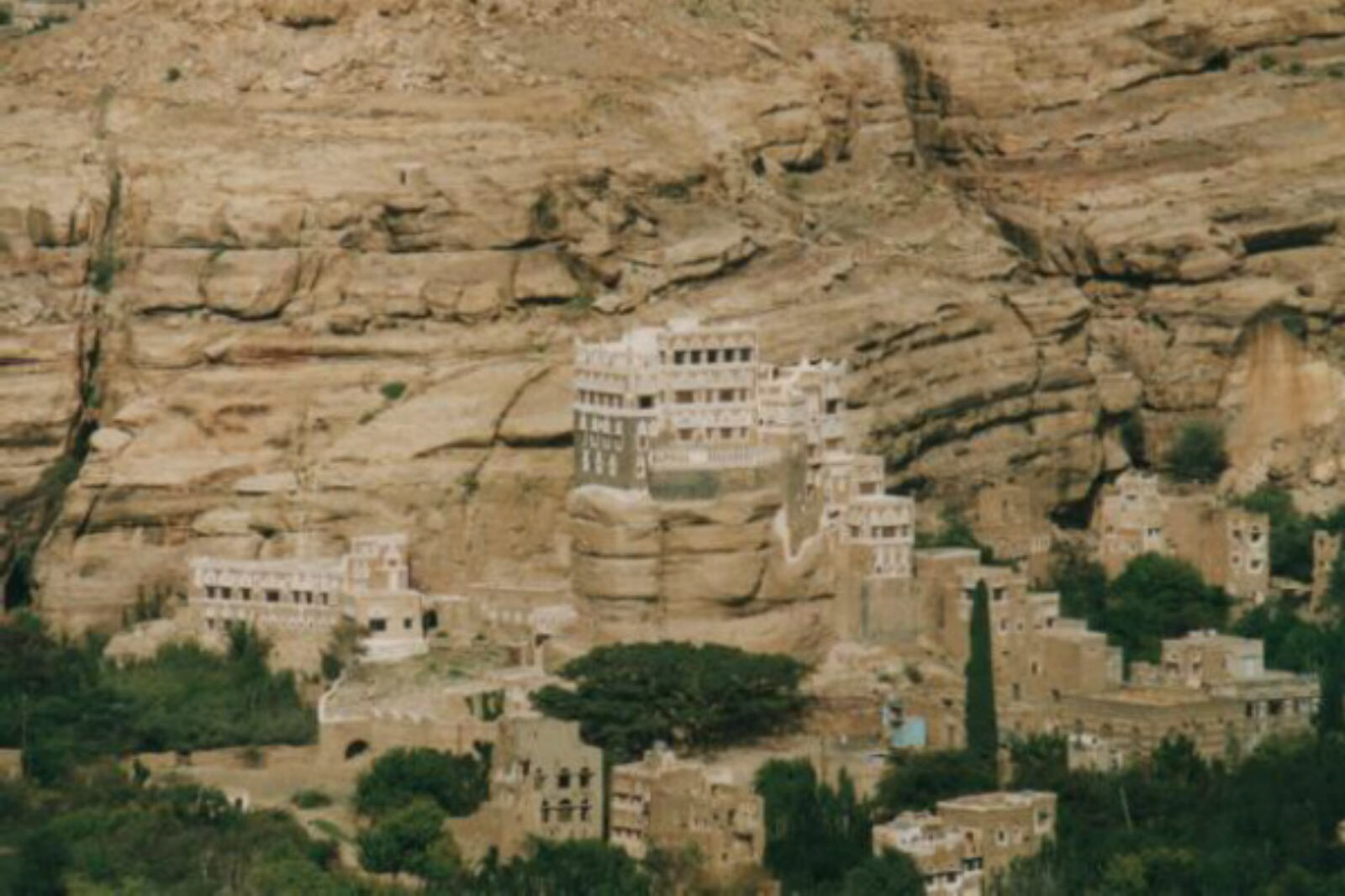
|
| Mohammed dropped us at one end of the wadi and we strolled
through, taking the obligatory photos of the house. |
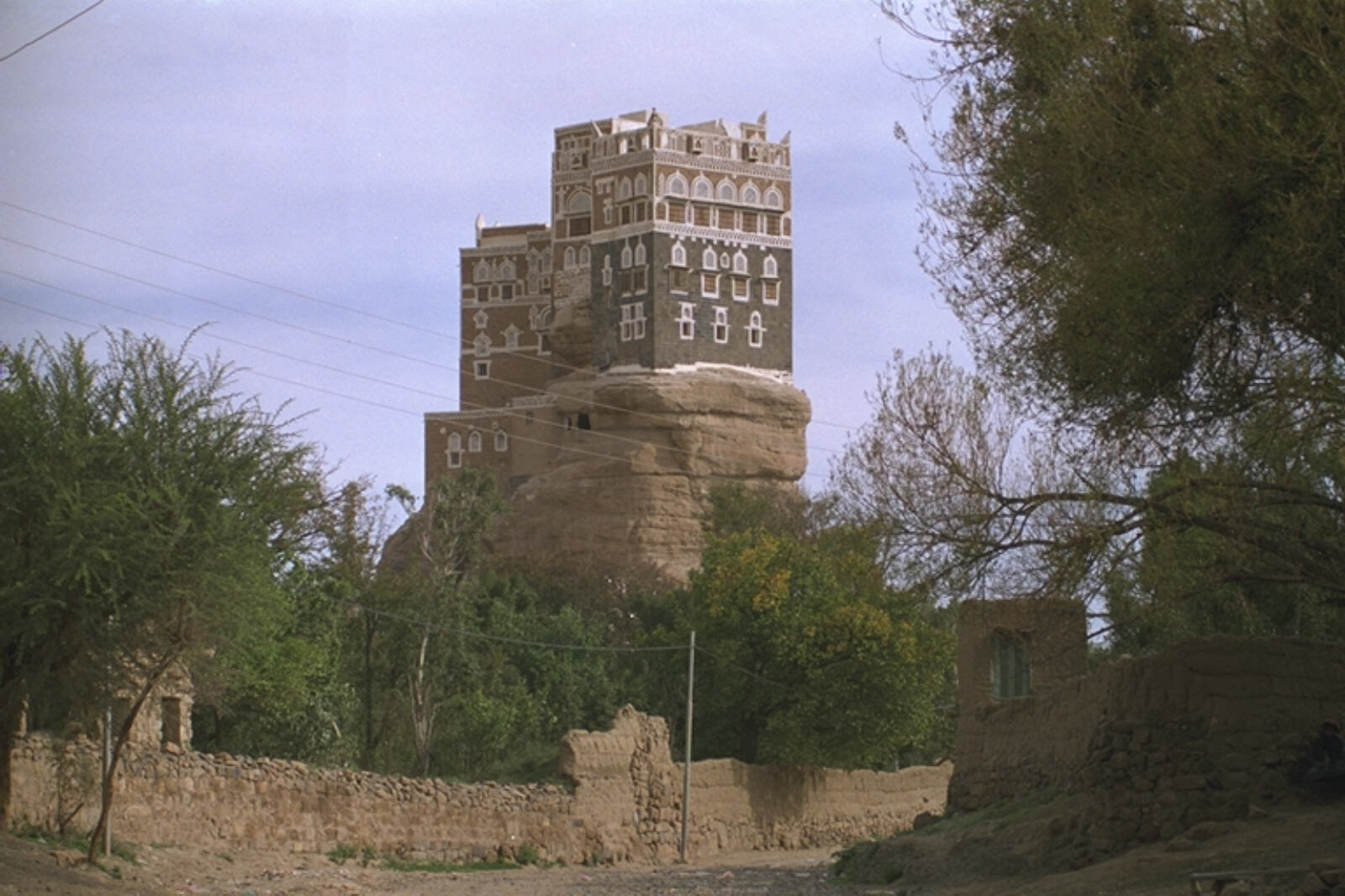
|
| Then we set off to Thilla, an old village perched on
the edge of a mountainside. Again we got off at one village gate and strolled
through to the other side, stopping to see the women collect water from the
big cistern. There were fascinating old houses and mosques, although the
people (particularly the children) seem very tuned in to tourists and keen
to sell us things. |
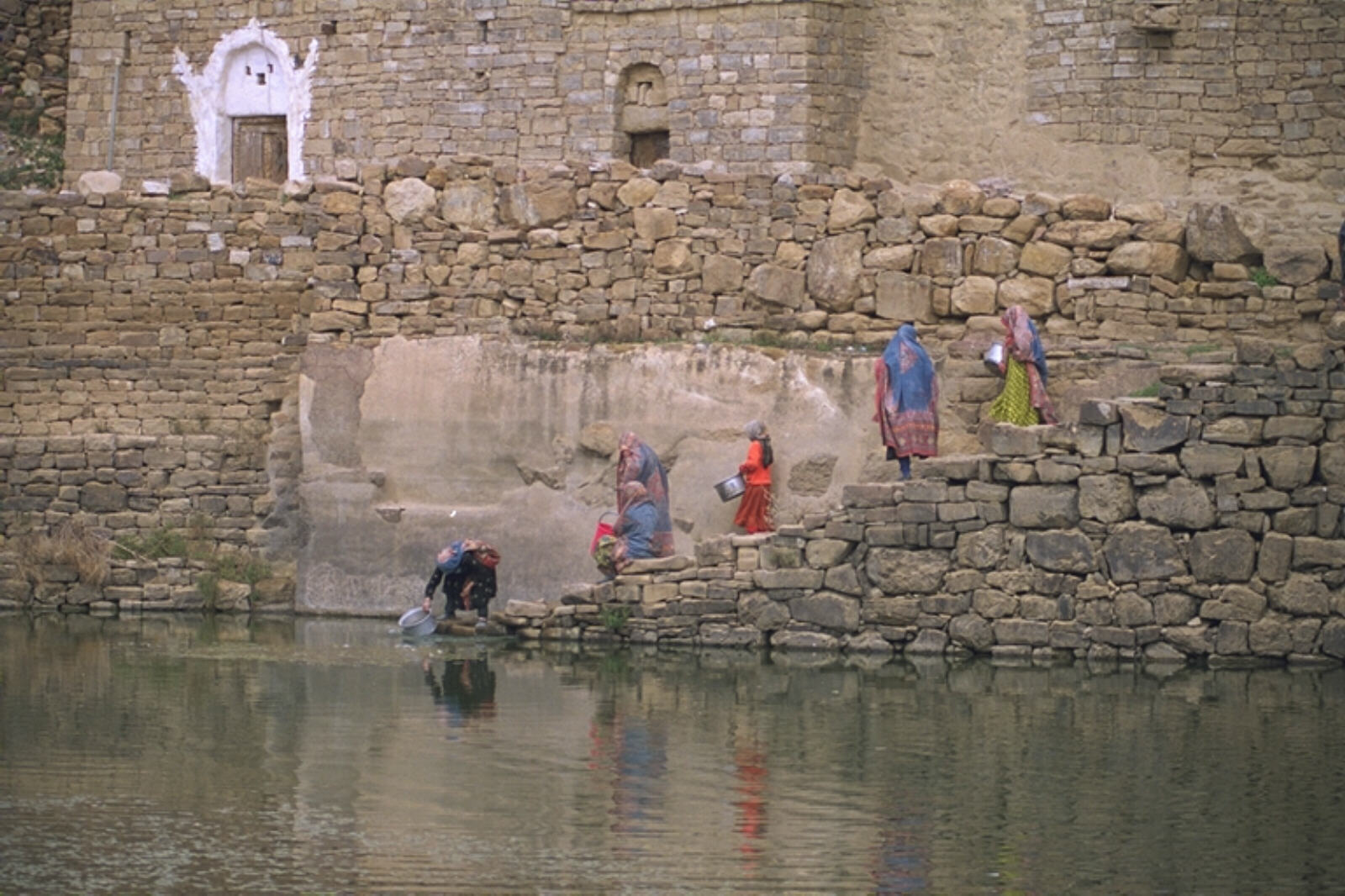
|
| We sat in the main square and had tea, then set off
again and drove to Shibam, sitting at the foot of a huge cliff with another
village, Kawkaban, perched on the top. We stopped in Shibam for lunch - a
Yemeni feast in a hotel - far too much food but most of it was very nice.
Then we drove up the new road to Kawkaban with an impressive gateway at the
top of the cliff. This road was only built four years ago and before that
the only way up was a very steep track/staircase in a crevice in the mountains.
We almost didn't make it to the top because one spark plug stopped firing
but Mohammed did some running repairs and we struggled to the top. |
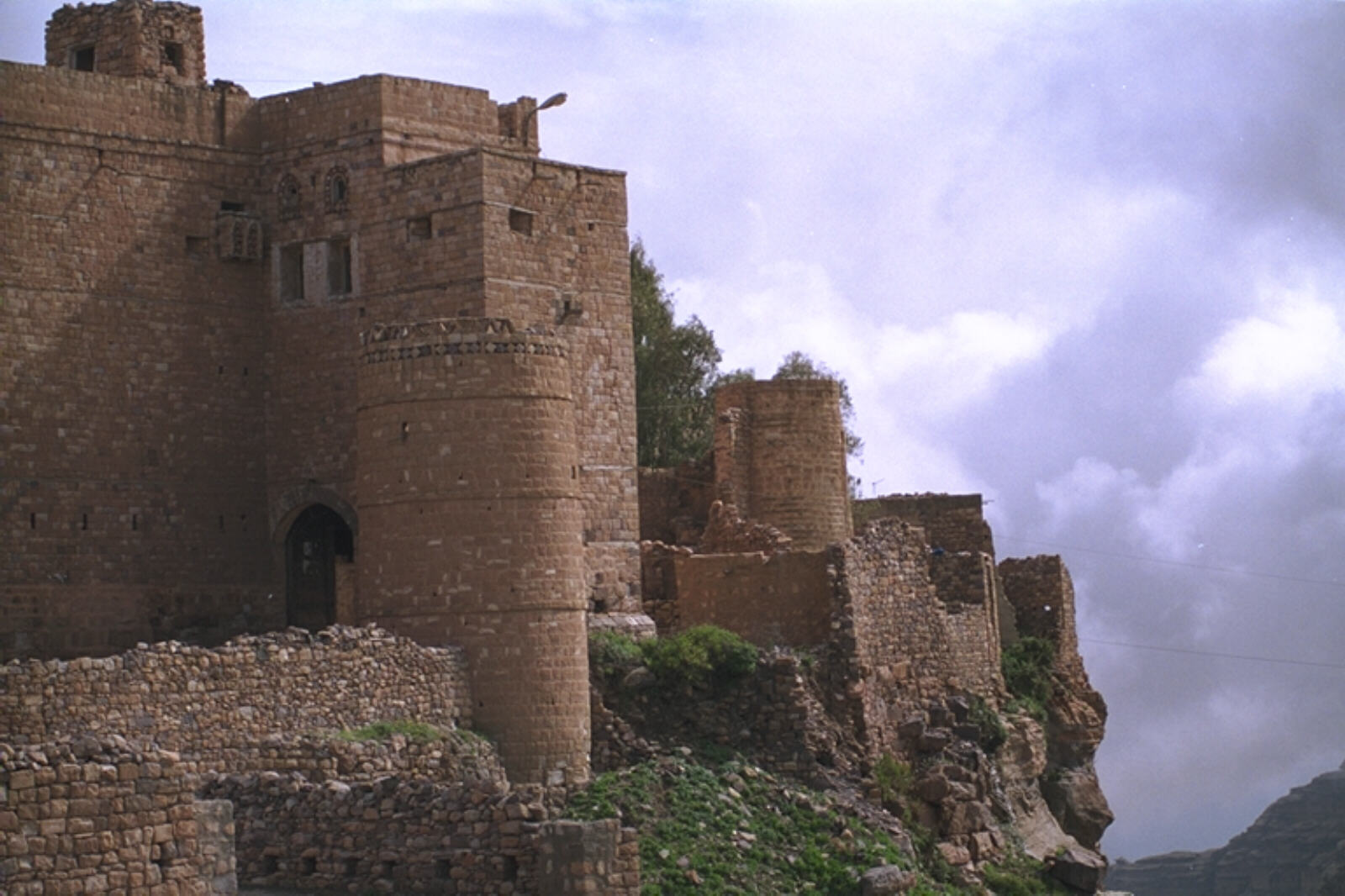
|
| There was not a lot in Kawkaban except a nice doorway,
some remarkable views and a very talkative Australian chap who told us all
about the film he was making, the cameras he's got, etc. We walked down the
track/staircase with him back to Shibam - over 1000 feet, but it's easier
than walking up! |
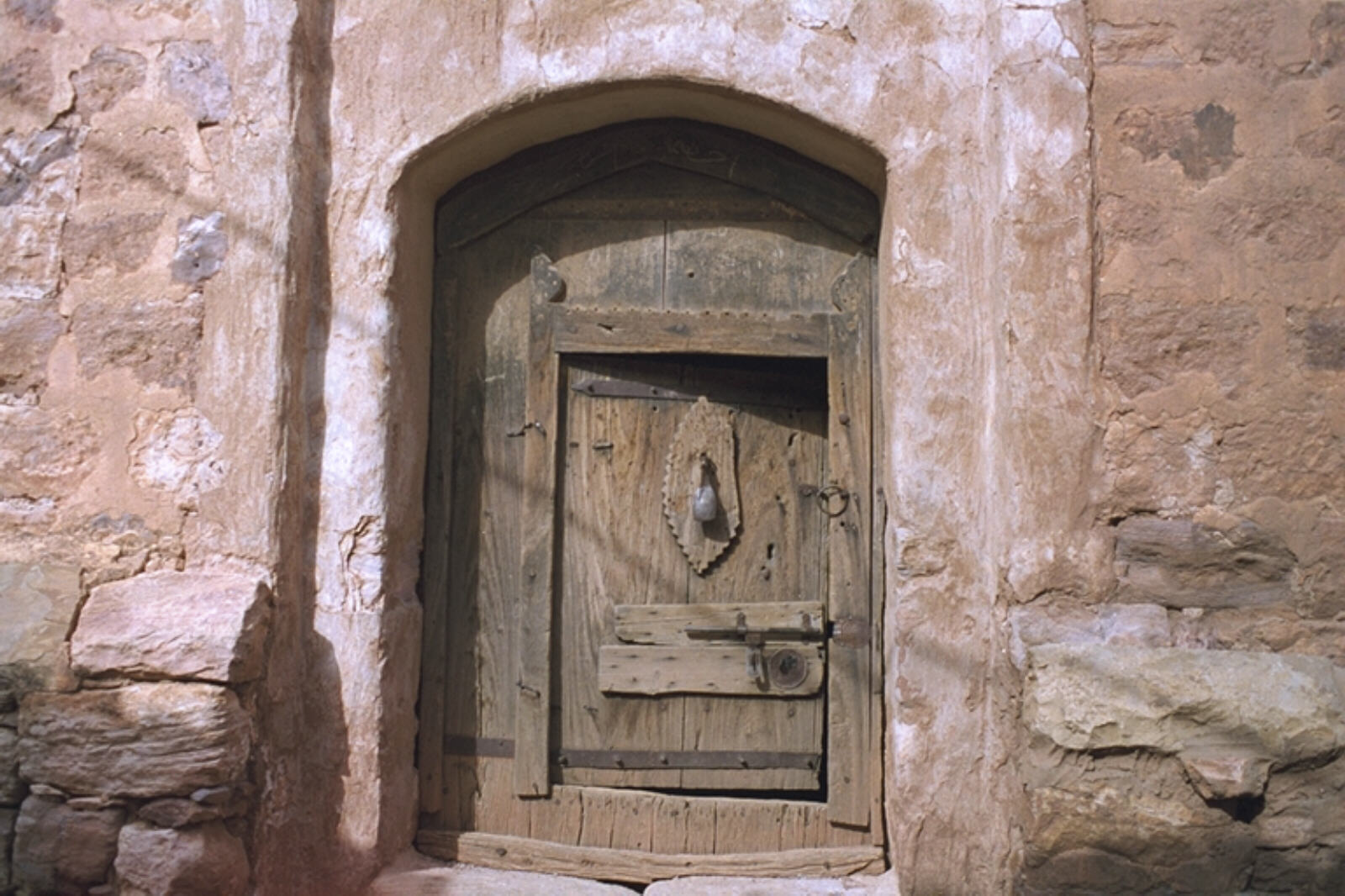
|
| Back in Sanaa we were tired, but not too tired for
our obligatory walk through the souk. Still not hungry after the huge lunch,
we went to one of the Hummus and burger restaurants on the main street and
had a hummus each and retired. |
Day trip to the Sabaean city of Marib
|
Fri 21st. Room 401 at the OSP was very picturesque
but rather noisy. A variety of dogs and jeeps populate the square and we
were in direct line for full muezzin-blast at the 4 am prayer time. Over
breakfast we finalised our itinerary for a week's trip to Aden and Hadramout
and agreed it with Mohammed. Then we set off for the day trip to Marib, which
is out in the desert to the east, in the lands controlled by the bedouin
so we will need a military escort. After stopping to look at the cattle and
sheep market on the outskirts of town we went to the rendezvous point to
pick up the escort. There was us in Mohammed's ageing Mazda taxi plus 30
land cruisers from the Sheraton, the Taj and the tour companies. One of their
passengers said we looked very dashing, because our driver was the only one
wearing Yemeni-style dress and ours was the only vehicle that wasn't shiny
and new and covered in tourist stickers.
We set off in procession, led by a jeep with a machine gunner mounted in
the back. At another checkpoint halfway there we acquired our own personal
soldier who travelled with us the rest of the way, complete with his Kalashnikov
resting jauntily on his knee. This was because the drivers of the land cruisers
all have guns but Mohammed doesn't. We arrived at Marib and stopped at a
restaurant in the 'new' town for lunch - two tasty half chickens and a plate
of cinnamon rice, a pepsi and two teas, for a rather steep YR520. Then we
commenced Mohammed's tour of the sights (or sites) of Marib, which are all
rather spread out. He took us to them in reverse order, so although we passed
the land cruisers along the way, we had the places to ourselves when we got
there. First were two ancient temples - no-one really knows what religion
was practised here, but they are about 3,000 years old and are attributed
to the Queen of Sheba, the most famous person who ruled these parts. Lying
around all over the place are stones inscribed with Sabaean script, one of
the early alphabets. |
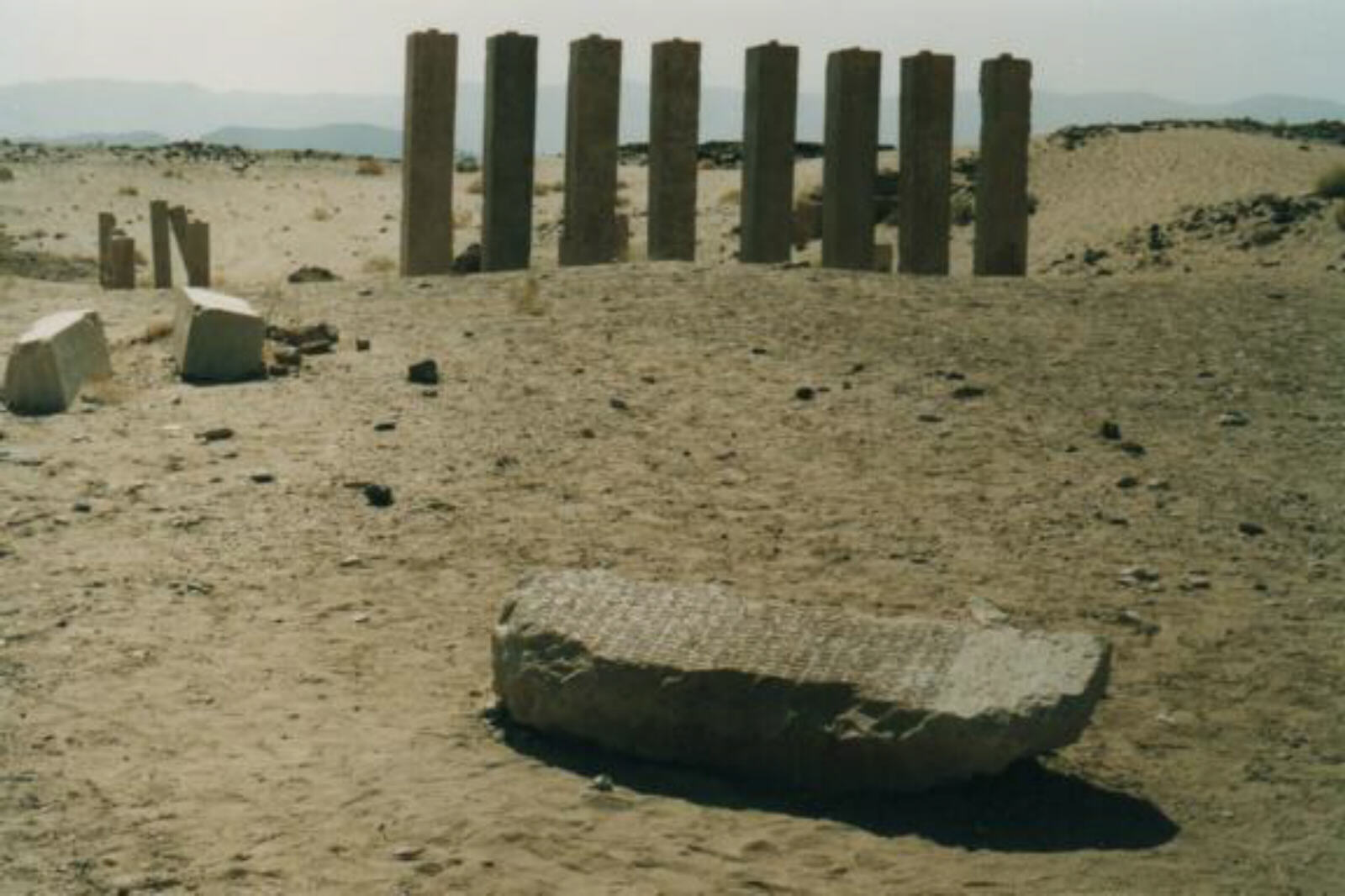
|
| Next was the ancient dam, which was the source of the
Sabaeans' wealth and made the Queen rich as well as famous. All that is standing
now are the huge sluices at each side where they let the water out into the
irrigation canals, but the dam itself must have been vast. Equally impressive
is the 'junction' where the big canal from one of the sluices splits into
12 different canals which fan out over the valley - each one with its own
mechanism to control the flow. A little further up-wadi is the new dam, behind
which is a huge lake sparkling in the sunshine. The old dam must have looked
something like this thousands of years ago. |
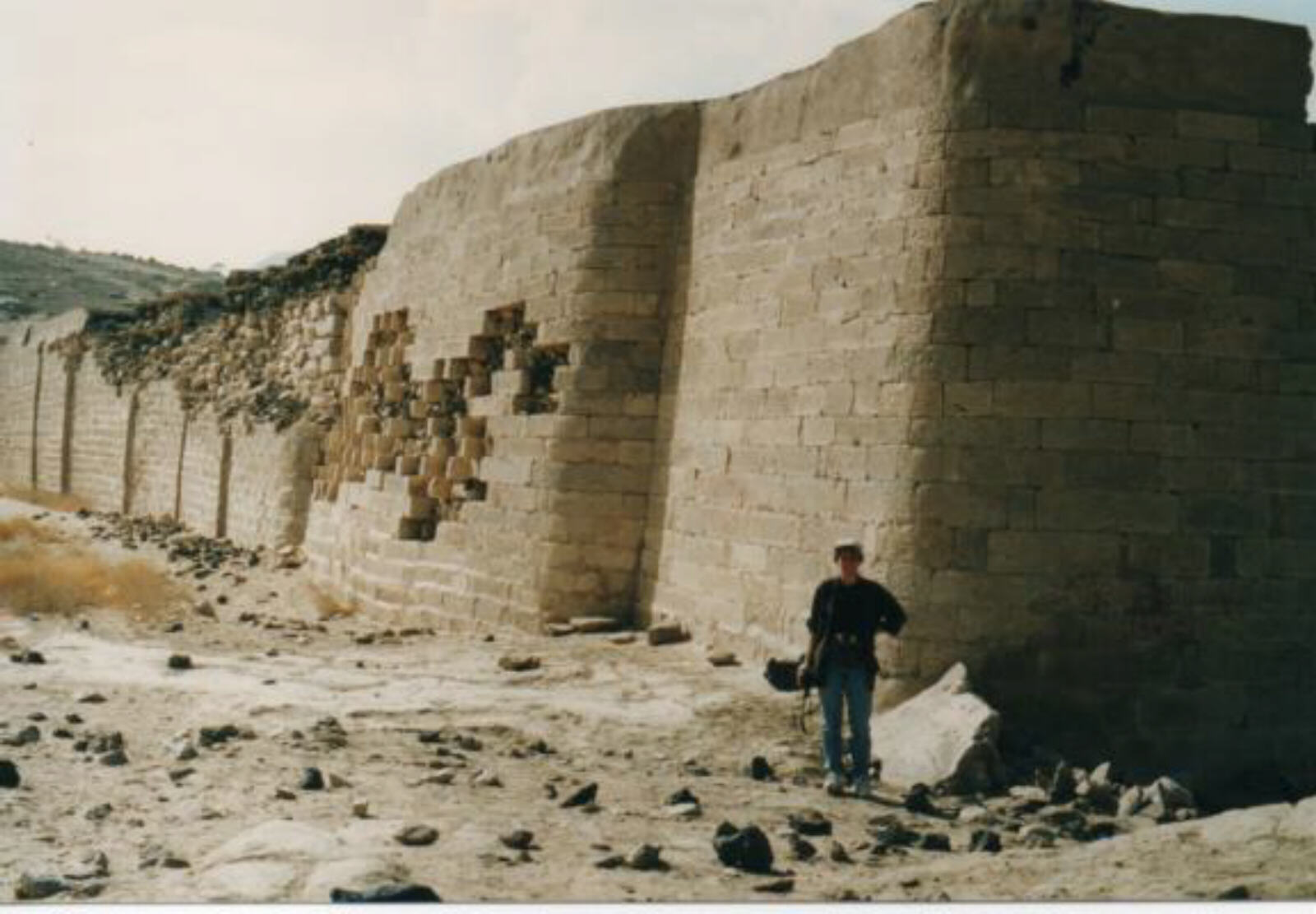
|
Finally to the old city of Marib, which is a set of
picturesque ruined tower houses perched on a mound in the middle of the valley.
We climbed up the steps to the top of one of the houses to take photos -
the style and plan of the house is just like the hotel we're staying at in
Sanaa, except this house is dusty and deserted. We had a long drive back
to Sanaa, stopping for Mohammed to pray and us to change money at Tahrir
Square.
We didn't go out this evening, but sat in the hotel restaurant swapping
travel stories with a retired English couple who had driven their specially
converted land rover (with sleeping quarters on the roof) from England to
Iran, then shipped to the Emirates and driven through Oman and across the
south Arabia coast into Yemen with many adventures along the way; and a Canadian
couple who used to organise and run overland expeditions but now have desk
jobs and just travel for fun (last year to Vietnam and Cambodia). There had
been a person blowing a whistle at annoying irregular intervals all night
in the street outside the hotel. When I went to have a moan about it I found
that it was one of the city night watchmen. His job is to patrol the square
at night and whenever anyone crosses it he blows his whistle to alert the
watchman in the next square that someone is heading his way! I felt even
more as if I had entered a medieval time warp and I went back and slept soundly
in my bed knowing I was safe and protected from miscreants in the night.
|
Part 2 - Motoring with Mohammed
Yarim and Taiz
|
| Sat 22nd. We set off at 7 o'clock feeling a bit below
par with a cold/flu bug we'd both picked up. Mohammed drove us south through
fantastic mountain scenery with lots of picturesque villages, many perched
on inaccessible hilltops. Mohammed, who had limited English, would suddenly
point at things and say 'Photo'. At first we obediently photographed everything
he pointed at but then we realised that each of these were things that some
previous tourist had asked him to stop to photograph and that we would rapidly
run out of film, so we became more selective. We turned off in Yarim for
a side excursion to Hammam Damt, a most peculiar volcano and collection of
hot springs. We struggled all the way to the top of the volcano to look inside
the crater where there's a long drop down to a pool of apparently boiling
water. Back in the village itself we went to one of the hot springs which
has been turned into a swimming pool and had a welcome drink of cold mango
juice. Further on past Ibb we turned off for Jibla, another picturesque mountainside
village. We got completely lost trying to walk up to the historic mosque
of Queen Arwa (c.1100 a.d.), and had to pay someone baksheesh to show us
the way. We also had to pay baksheesh to the disreputable looking, ghat-chewing
imam for taking a photo of the mosque. |
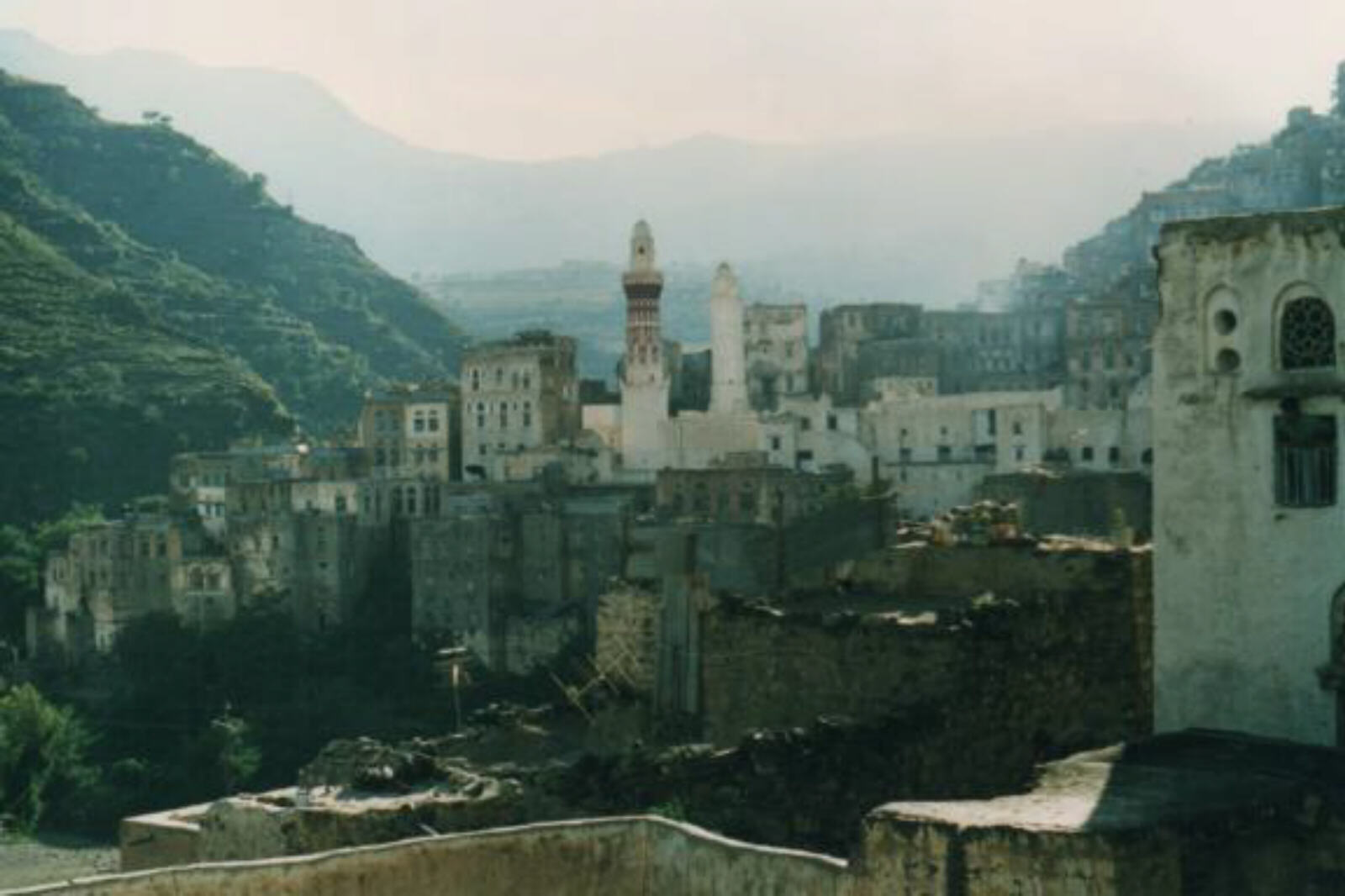
|
We drove into Taiz as it got dark and had a furious
row with Mohammed about which hotel to stay at. He took us to the Plaza which
looked OK and where he obviously had an arrangement with the people, but
we insisted on going to the Al Walid which had been highly recommended but
which frankly was a disappointment. There was no hot water, the furniture
surfaces were grubby and sticky and the beds were hard, which was the opposite
of what we'd been led to expect. We went out for a plate of beans then retired
about 8:30 feeling awful.
Sun 23rd. After yesterday's rather inauspicious start, Taiz turned out to
be quite nice. Mohammed first took us to the Al Akwah hotel for a view over
the city from the north side. Then he dropped us at Bab al Kabir for a walk
through the nice but small souk to Bab Musa where I had my trainer sown back
together by one of the shoemakers for 50 pence. Then up the mountain for
a view of Taiz from the other side and down to the National Museum which
is the old Imam's palace, crammed full of all his 1950's gadgetry and his
throne, just as it was when he was deposed in the 1960s. Everything looks
untouched and covered in dust, very atmospheric. |
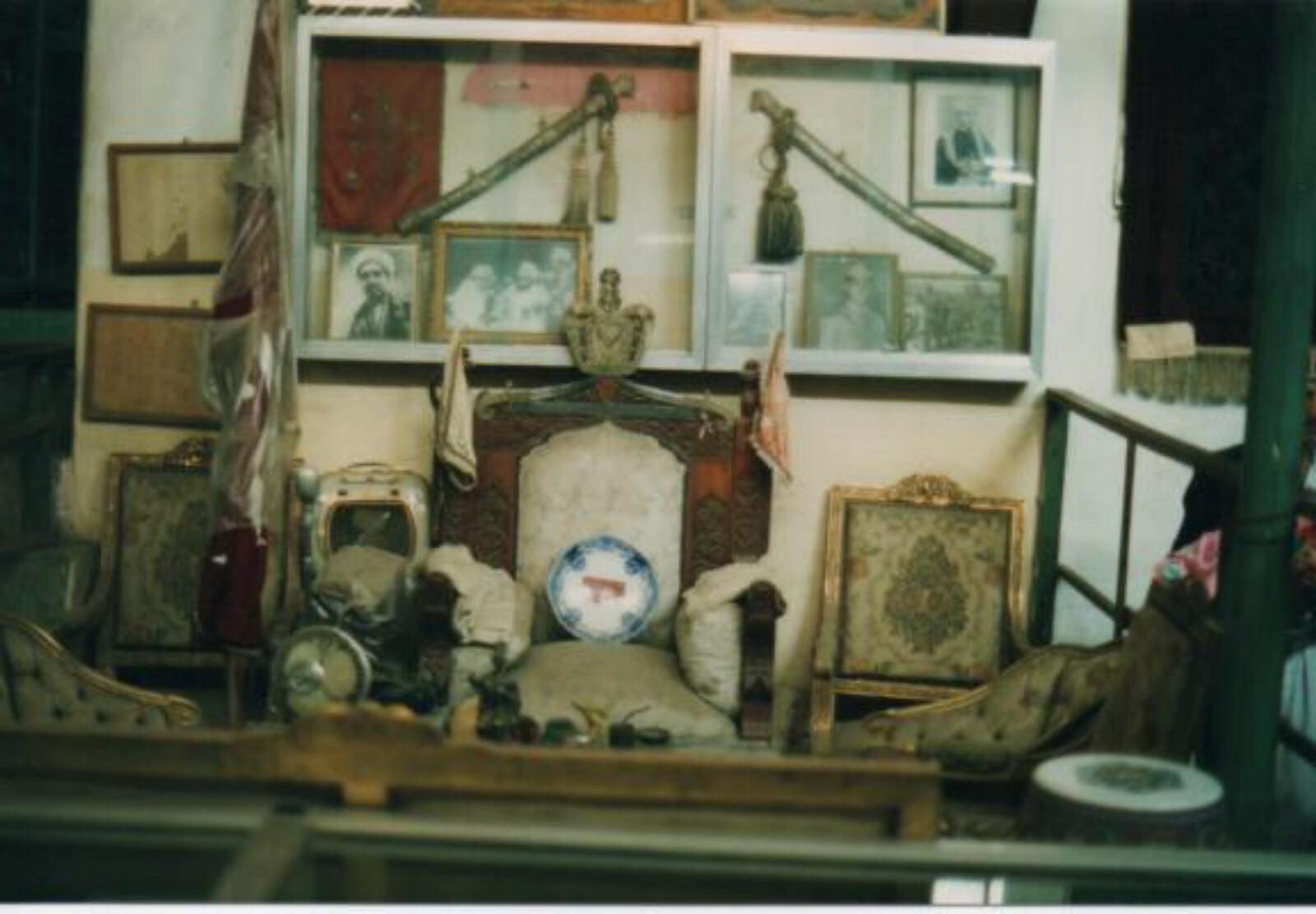
|
| On the way out of Taiz Mohammed took us to the Al Jamad
mosque which is the oldest in Yemen and was built in the lifetime of the
Prophet Mohammed. In each alcove there was a little 'Sunday school' in progress
with a group of children in front of a blackboard on the wall. We were shown
round by a very friendly imam/caretaker/guide and the usual crowd of hangers-on.
|
Aden
|
| Then we went down, down out of the mountains onto the coastal plain and to Aden, which is a huge dark volcanic crater brooding under a thick cloud. We asked Mohammed to take us straight to the Crescent Hotel, which is the recently-restored old colonial-style hotel near the port and he put up no resistance this time. It's a wonderful hotel with great wooden shutters on the windows, where we had a huge room with comfortable furniture (and efficient air conditioning - Aden is very hot and sticky), a spacious bathroom and a big balcony. Wonderful! Sheila retired immediately to the soft, comfy bed for a nap while I went out sightseeing.
|
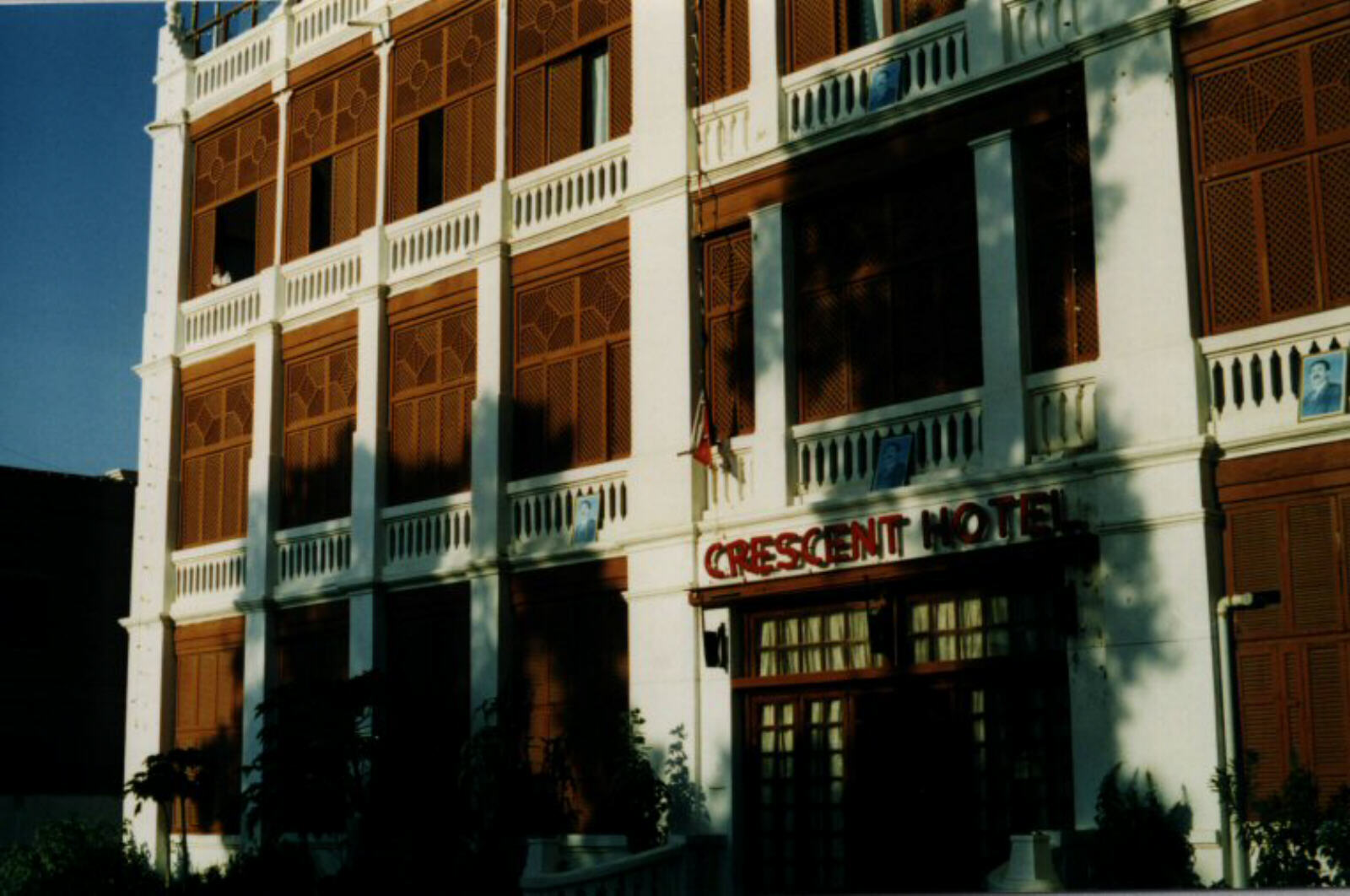
|
|
Mohammed too had retired for a nap in the car so I walked round to Steamer Point and took photos of the quayside and leftover buildings from the British days. |
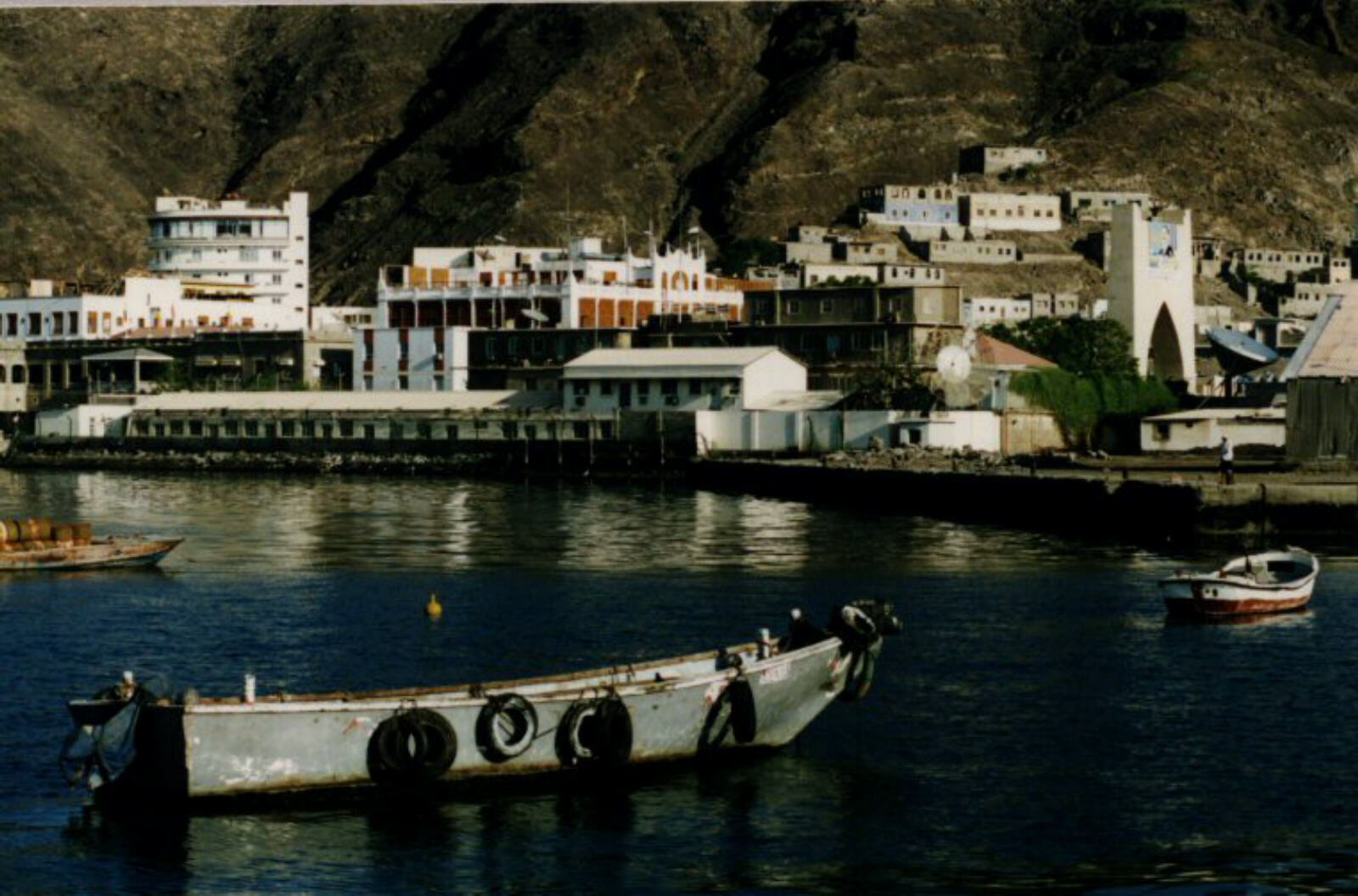
|
|
I went back to the Crescent hotel and Mohammed took me on his tour of Aden - up the hill to see the old houses where the British had lived, a nice beach, views of the harbour and down into Crater, the town in the middle of the volcano. I stood watching the sea and the sunset while Mohammed said his prayers then we returned to the hotel. Sheila was feeling much better so we had dinner in the hotel dining room as soon as it opened (quite nice, but what we got was nothing like what we ordered!) and retired for another early night.
|
To see some more pictures of Aden, just click the ship ....

|
|
Mon 24th. We got up at 4 for a really early start at 5am. Mohammed had slept in the car and was badly bitten by mosquitoes. He also overslept and was late for the mosque, so we started in a bit of a flap. We stopped just round the corner for tea and ate the packed breakfast that the hotel had prepared for us, salad croissants. We gave Mohammed most of it and it seemed to restore his vigour and spirits. We set off for the 550 or so kilometre drive to Mukalla. After the first 100K or so we turned towards the mountains and the scenery became spectacular again. It was a long hard drive but much more interesting than we expected and the heat was mitigated by the occasional downpour of rain and the mostly cloudy sky. |
Bir Ali and Mukalla, South Yemen
|
For most of the way we had to be guarded by an on-board soldier to protect us from the bedouin. The soldiers had to swap over at each checkpoint and we had to give each one baksheesh, which annoyed Mohammed who felt that part (if not all) of the road was safe and the soldier unnecessary. We stopped for a rest and a look round in Bir Ali (Ali's well), a little fishing village which could be outrageously picturesque if the houses weren't falling down, the streets not full of rubbish and the sea shore not a toilet. We drove on and arrived in Mukalla by dusk. There seems to be a whole new town being built on the outskirts of Mukalla - it's hundreds of miles from anywhere so I've no idea why. Mohammed took us to his first choice of hotel, the Al Maseela which had the most comfortable beds so far but a pretty awful bathroom for YR3500 ($17). If the Yemenis have one weak point it's plumbing - we haven't had a bathroom yet that didn't smell awful and you wonder where the pipes lead to - you're lucky if the waste gets out of the building. The hotel was situated in the back part of the town away from the sea, which is pretty nondescript. We started to walk around when it began to pour with rain, so we had a couple of tasty shawarmas (kebabs) from a street stall and a chai (tea) and returned to the hotel. Mohammed suddenly appeared (he had disappeared as we were checking in) and said he had got lost parking the car and/or met some friends and taken them to the airport - I'm not sure which, his English or mine wasn't up to it. I explained that I was running out of film for the camera so he made some enquiries and took me to a quite modern camera shop down the street to buy some more. Mohammed must have got a good rate at this hotel because he is in a room down the corridor instead of sleeping in the car.
Tue 25th. Really excellent breakfast up on the 6th floor of the hotel - we weren't particularly early (about 7 am) but they had to unlock the restaurant for us so we must have been the first (or only) diners. Then we drove round to a local puncture repair workshop to fix a slow puncture the car had developed yesterday, while Sheila fumed that we could have had a lie in while this was happening! Then we set off for Wadi Hadramout, but it wasn't that easy. We were turned back at the first checkpoint for not having the right permission for the journey. We drove around Mukalla looking for the right police station and when we found it Mohammed went to sort it out while we had a look around. (We later found out that he had made this journey only once before in his life, and was far less familiar with it than he claimed). Luckily we were at the much more interesting and picturesque end of Mukalla town by the sea so we went to the old Sultan's palace, now another museum with the ex-Sultan's belongings and great value for YR30 (15 pence). The palace had superb views over the sea and down to Mukalla port, sparkling in the sunshine. One of the exhibits was the top secret letter from the last British governor in 1964, informing the Sultan that the British would not be able to protect him any more and he would shortly be left to the mercy of his own tribespeople! (or diplomatic words to that effect). |
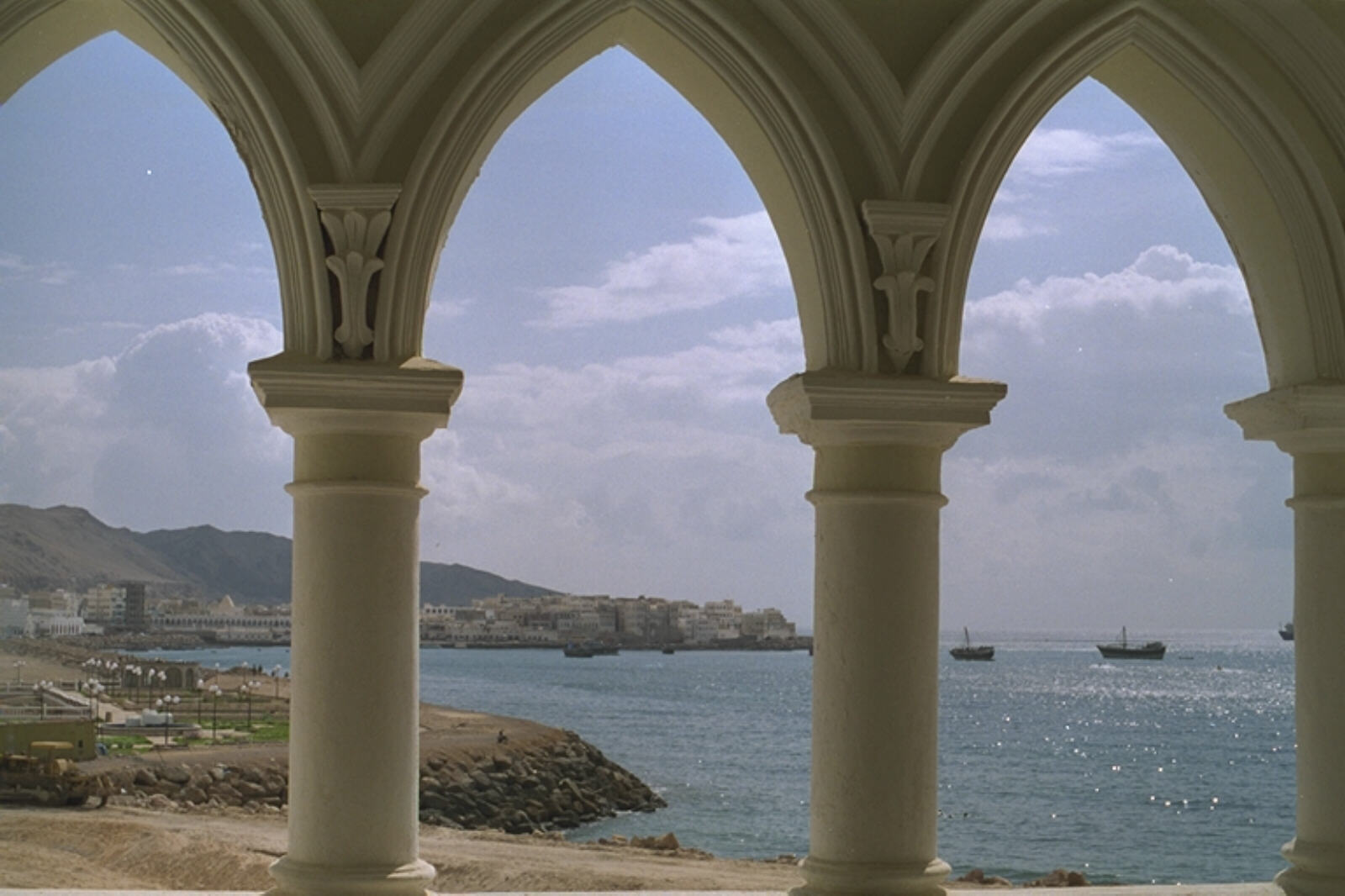
|
|
Sheila sat in a teashop watching a group of schoolchildren having their breakfast/ elevenses/ lunch while I walked down to the port taking photos. It was about 10 am by now and the sun was very hot. In the centre of the old town Mohammed and Sheila turned up suddenly with the right paperwork and Mohammed was keen to get going. This extra bit of paperwork, which apparently wasn't necessary last time he came, cost another 400 YR per person, so 800 ($6) for me and Sheila. All these extra bits and pieces seem to mount up. We drove up from the coast into the mountains again and emerged onto a wide, flat, empty desert tableland at the top. The road was excellent and we sped along with no holdups or speed bumps. We stopped for lunch in a wayside taxistop in the middle of nowhere. There was no furniture - you sit crosslegged on the surprisingly clean lino floor and they throw down a sort of circular reed mat that they put the bowls of food on. We had tasty cinnamon rice and chewy meat and bone bits in an onion soup again, like the previous lunch stops - not bad actually, but Sheila settled for three hardboiled eggs. |
Wadi Hadramout - Shibam, Sayoun and Tarim
|
|
We carried on driving across the desert, then descended steeply into the valley of Wadi Hadramout, and immediately started passing picturesque villages with tower houses and palm trees looking very colourful in the sunshine and clear blue sky. I took endless photos of the buildings as we continued, but had less success photographing the women wearing the most unusual local costume - high pointed witches hats made of some sort of matting, on top of the all-over black outfits covering every inch including hands and faces. They must be fed up with being photographed by tourists because they were very against the idea. |
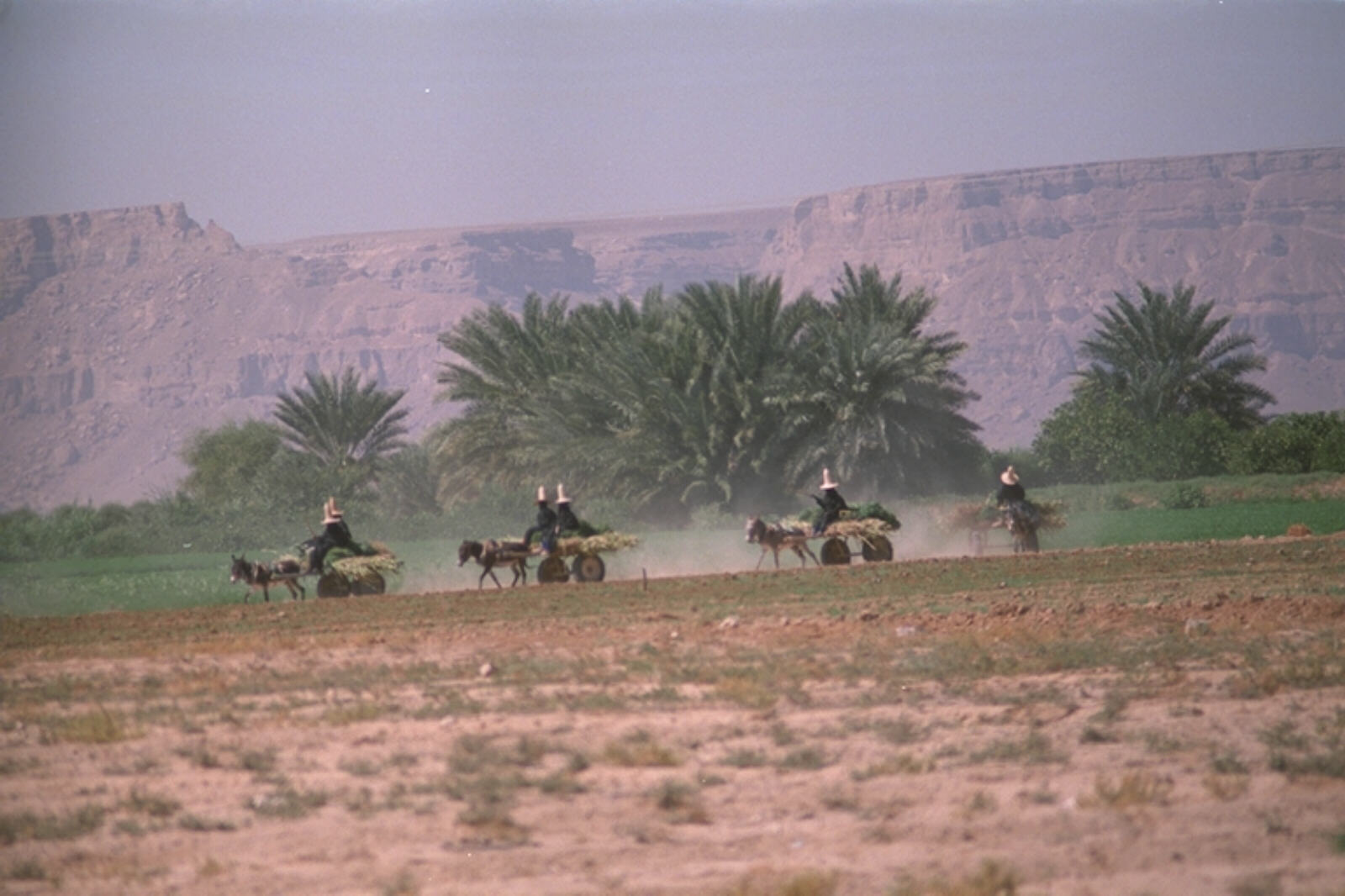
|
|
We drove past Shibam (a different Shibam to the one near Sana'a) with its amazing 'skyscraper' façade. |
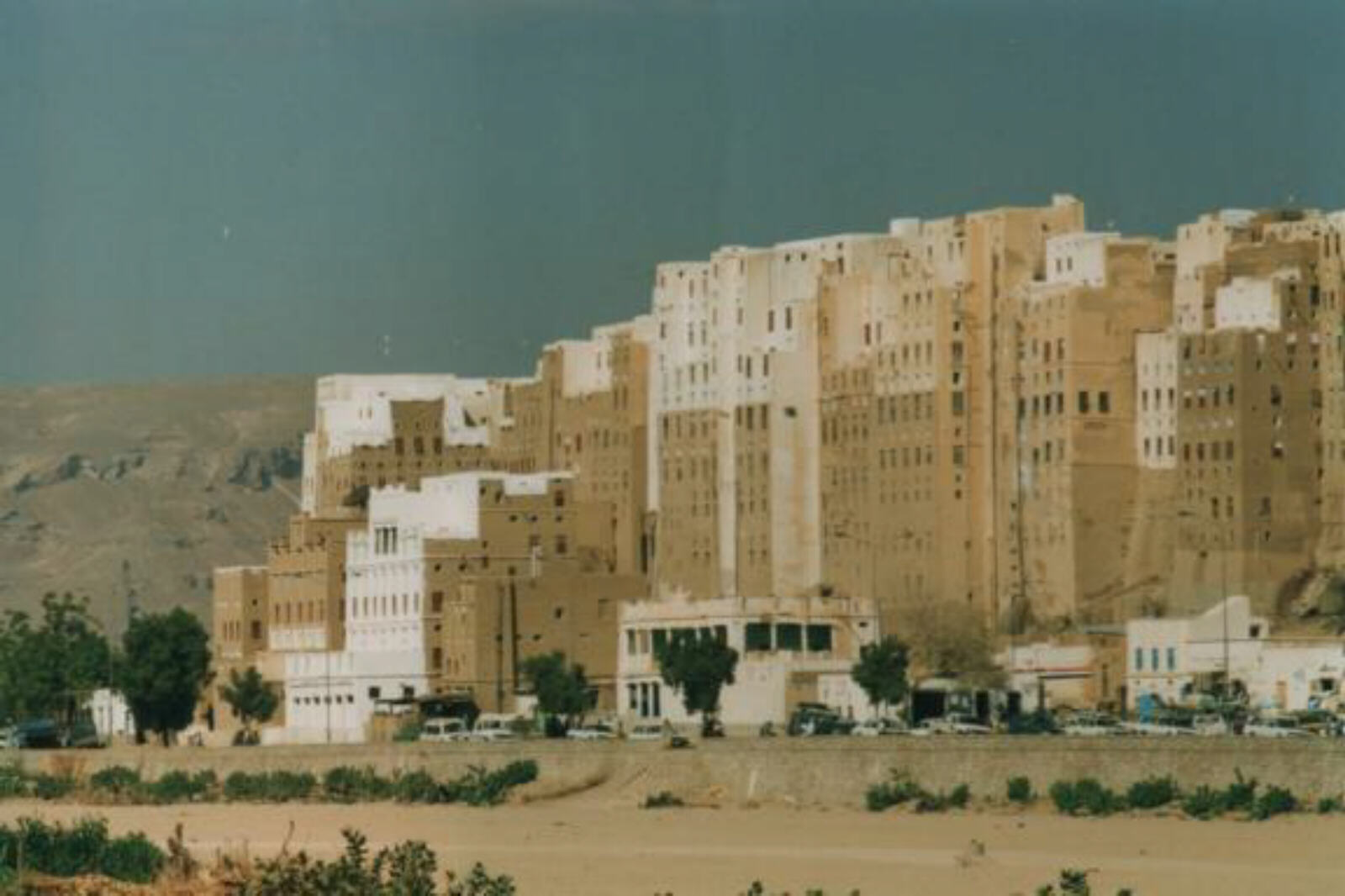
|
Mohammed suggested staying at the As Salaam Hotel in Sayoun, which by happy coincidence was the one we were going to insist on! And when we got there the hotel itself was a wonderful surprise - we had been told about the swimming pool but the rest of it was nice too; the rooms are set on two storeys around a couple of central courtyards filled with palm trees, it's quiet (no traffic noise and only the occasional cockerel) and comparatively clean. Almost Mediterranean. The shower even had hot water - in fact it was boiling and it was hard to adjust it down to a bearable temperature. All for YR2441 (under $20) (I've no idea where the 1 YR came from!). We checked in then had the ultimate luxury after a long, dusty drive across the desert; a swim in a clean, warm, deserted swimming pool under the palm trees and the stars. Sheer bliss. Feeling much refreshed we went for dinner at the hotel restaurant which was also surprisingly good - a non-alcoholic beer, vegetable soup, tasty camel stew with chips, spicy veg and rice, caramel pudding and tea for YR1300 ($10) for two. We retired ready to sleep like logs, and would have done but Sheila was aching badly from the drive and the draught from the car window.
Wed 26th. We sat by the pool in the cool and calm of the morning to write. Then a late (by our standards) breakfast at 8 o'clock in the hotel restaurant and off for a gentle day's sightseeing. We started in Sayoun at the same time as a party of tourists in land cruisers so we sat in a café and Mohammed bought us a refreshing lime juice drink while the tourists did the Sultan's palace. Then we did it at a more leisurely pace. There's no furniture left but the carved wooden windows give wonderful views over the city of Sayoun in all directions. |
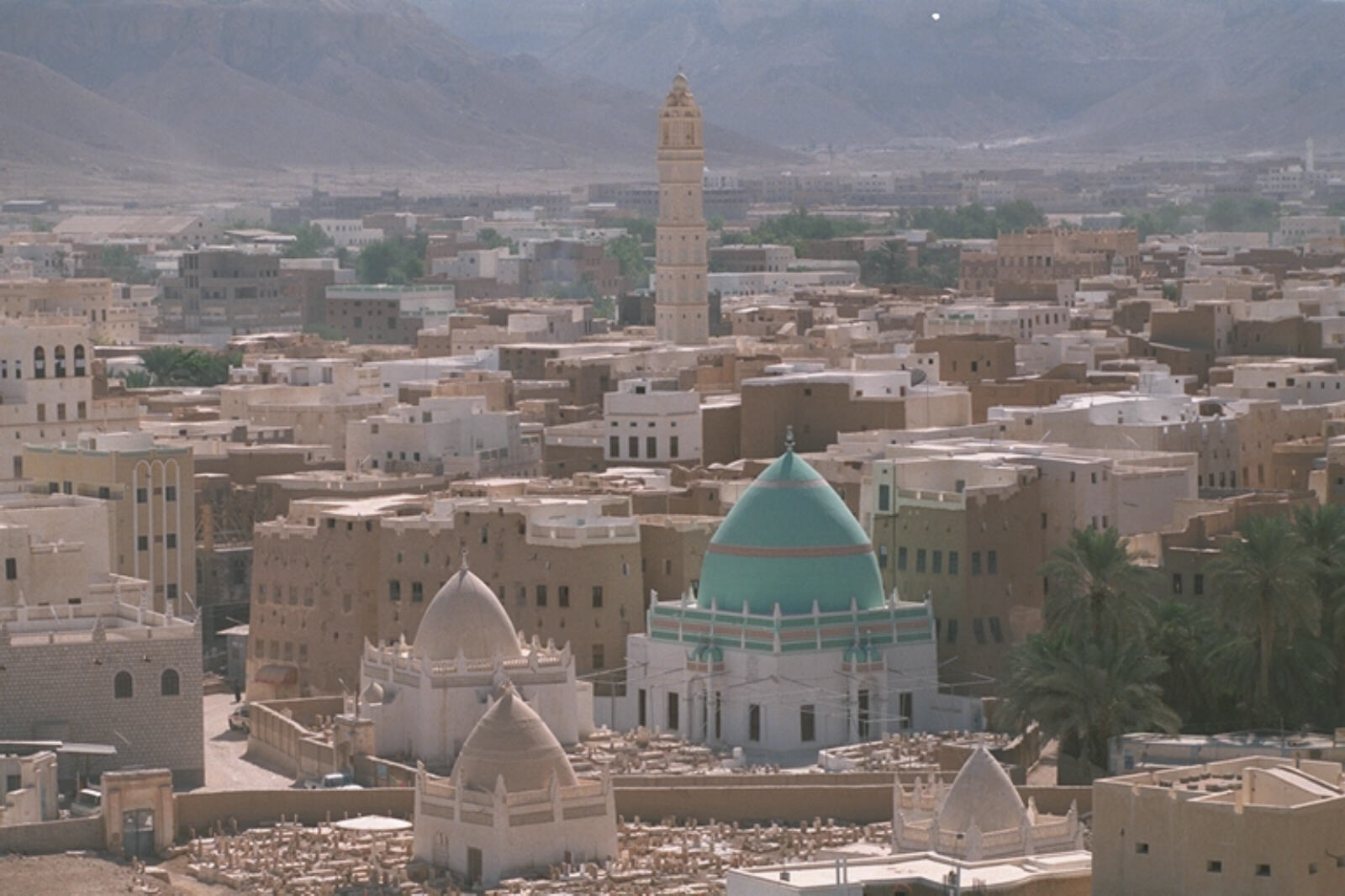
|
|
We saw all of Sayoun that there is to see from the palace so then we went to Tarim, which is more or less the extent of the surfaced road in the wadi. Tarim seems to have dozens of fascinating old mud-brick palaces all next to each other (not just the one big Sultan's palace like other towns) and we were just photographing the first one when Mohammed discovered one tyre was completely flat. Also (we discovered later) the spare tyre was flat and he managed to convey that we would justifiably have been cross with him if this had happened on the road miles from anywhere. We went into Tarim while Mohammed sorted the tyres out. |
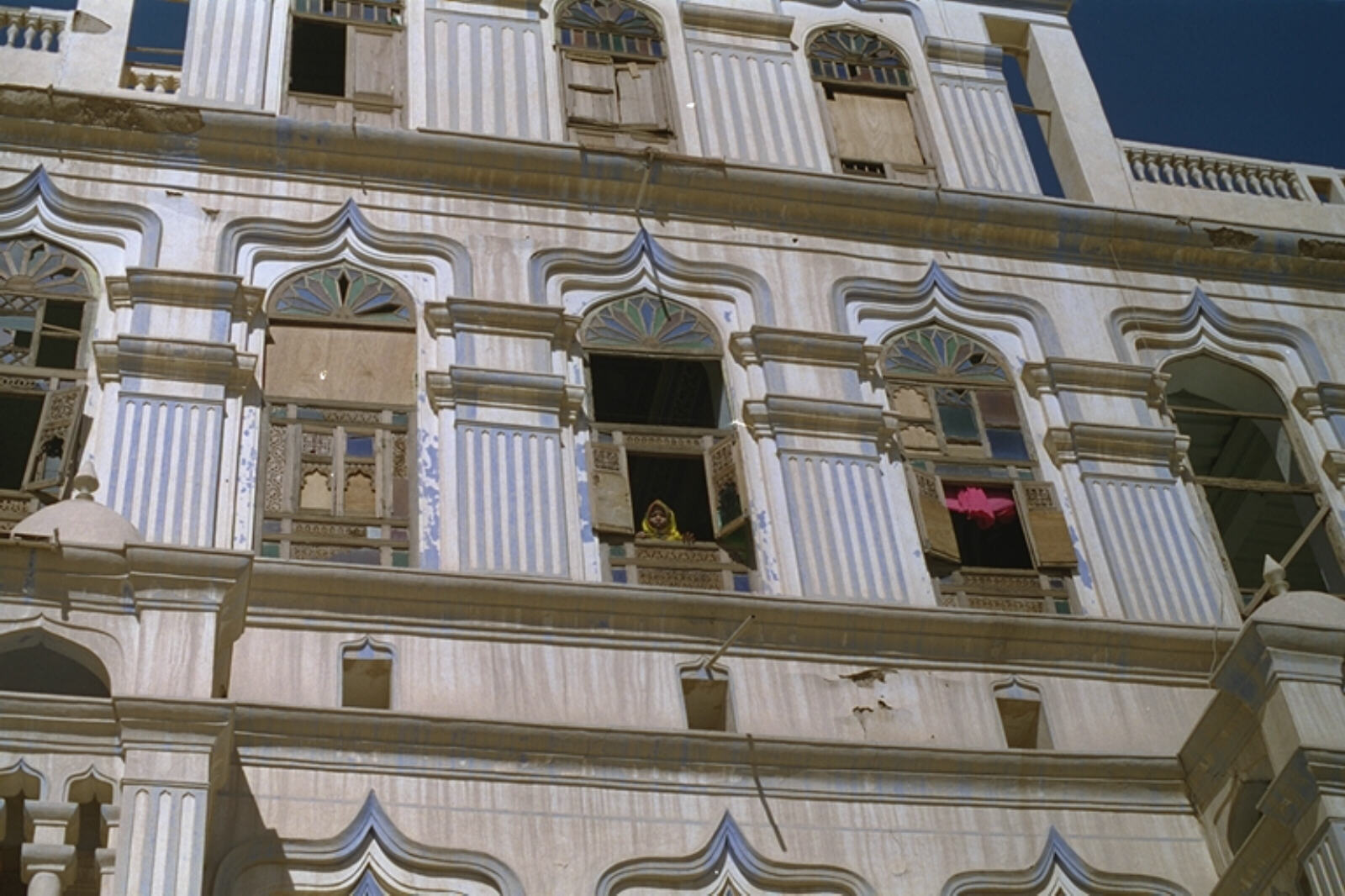
|
We found the much-photographed mosque with the highest minaret in Yemen but we couldn't find the town centre so we went back to the car after Sheila had helped a local lad with some difficulties of English grammar for his forthcoming examinations. We drove back towards Sayoun, stopping on the way at the historic tomb of Ahmad ibn Isa al-Muhajir where we took touristy photos and Mohammed said his prayers. Back to the as-Salaam hotel for a very nice lunch of lightly curried vegetables and rice, then Sheila went for a nap while Mohammed and I sat by the swimming pool chatting about money and religion. When he had to go off to the mosque I took a chair onto the balcony and sat reading in the twilight. A nice restful afternoon. I like Wadi Hadramout.
Thurs 27th. We had a bit of a lie in then a pleasant breakfast about 8 o'clock under the palm trees by the swimming pool then set off to 'do' Shibam. Shibam is a compact village of 400-year old mud-brick 'skyscrapers' all packed together inside a city wall on a small hill. We walked through the city gate into the main square which is like a miniature version of the entrance to Sanaa old city, but instead of the bustling market Shibam is very quiet with just a handful of men with donkey carts selling tired droopy vegetables. We walked all round the streets and squares of the town photographing the intricate wooden windows and doors. It was hot and dusty but quiet and peaceful. Went back to the café outside the gate and had a tea until Mohammed arrived and we set off.
|
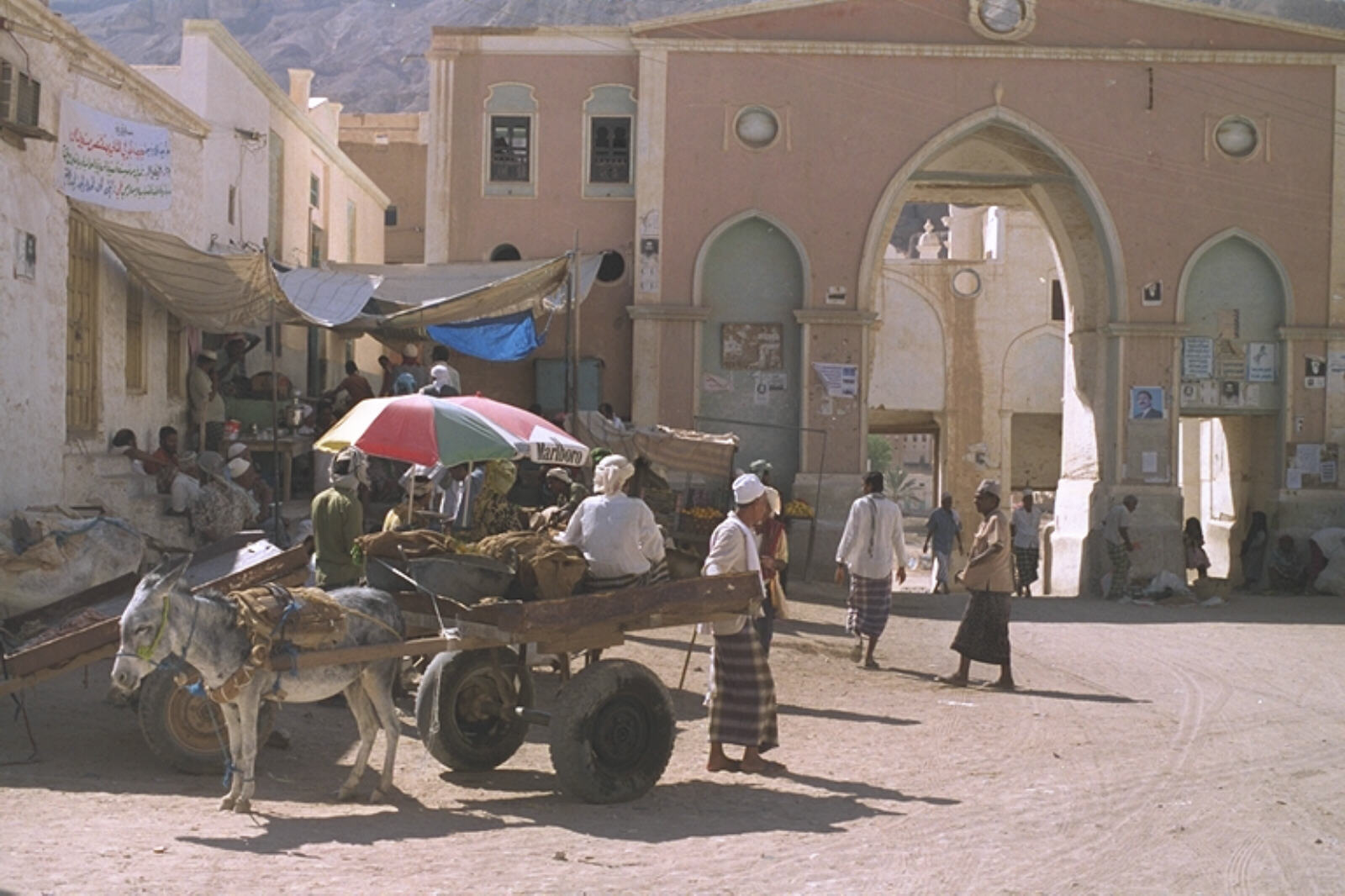
|
|
We played 'photograph the women in pointy hats' all down the wadi, finding dozens of them riding donkey carts, herding goats and crammed in the back of pickup trucks. Mohammed thought it was great fun. |
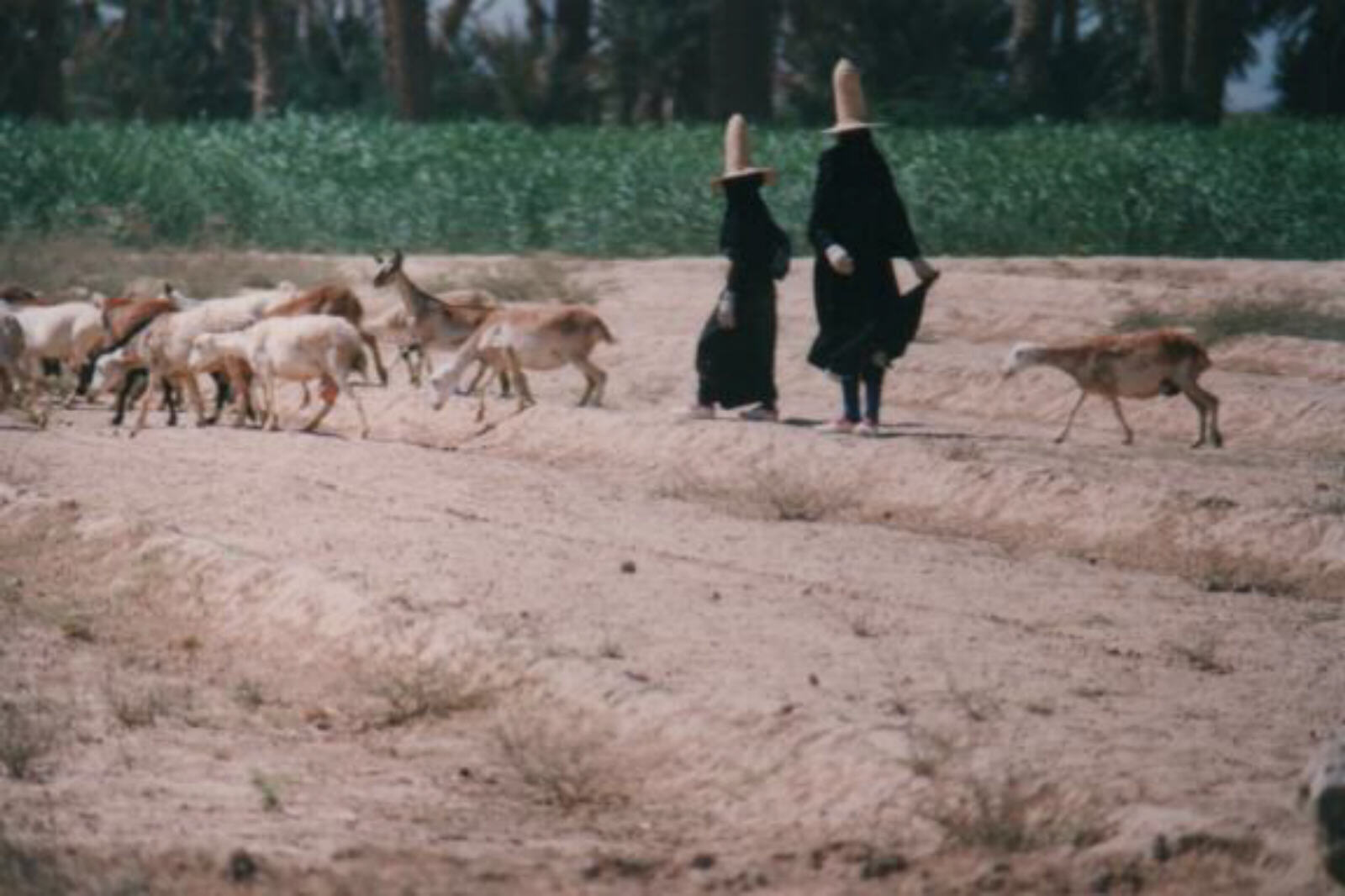
|
|
Finally we reached the end of wadi Al Ain, the last branch of wadi Hadramout, and drove up onto the desert plateau, just missing the perfect photo of the last house in the wadi, a small, square, sand-coloured house perched on a rock in the middle of a vivid green field, with a separate stairway over a small arch to the front door. |
Mukalla again
|
We drove across the open, flat plateau and stopped for lunch about 2 pm at a roadside stop. They had just killed a sheep and were cooking it in an 'oven' out behind the building - a dustbin-sized hole in the ground burning furiously with sticks and charcoal. We squatted crosslegged in the shade in front of the building and when it was ready they brought a big tin plate with chunks of mutton (on the bone) with cinnamon rice and hot chilli sauce. The mutton was delicious - crisp and salty and certainly fresh. After downing four glasses of tea (my two and Sheila's two) we drove on to Mukalla, arriving just after dusk, and checked back into the Al Maseela hotel. Down the road we had a dish of beans with bread for dinner.
Fri 28th. We went back for a quick photo of the house on a rock outside Mukalla. |
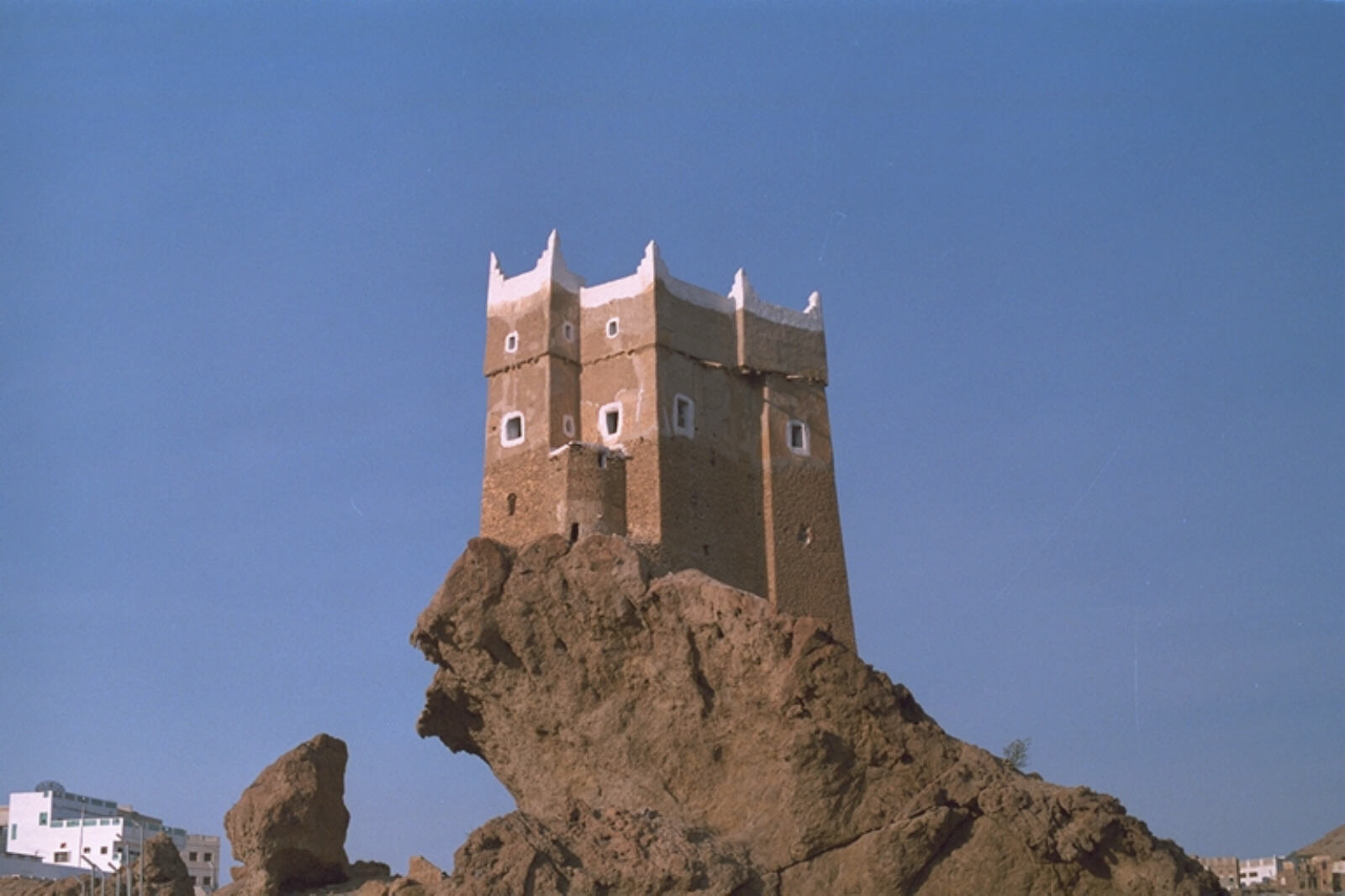
|
Al Baydha and Rada
|
Then we had the long uneventful drive across the south of Yemen, stopping for an occasional photo and up the steep, winding road to the top of the mountains at al Baydha. At first Al Baydah looked pretty unprepossessing, but we struck lucky, finding a basic but surprisingly clean hotel, the Al-Wehdah, for only YR1200 ($10). Even the bathroom was very clean, although it only had a squat toilet. We went out looking for dinner and again struck lucky, finding a little nameless restaurant where they were just about to cook some nice lean meat pieces. Sheila dictated the other ingredients to the chef - onion, tomatoes, chips and spices, and it came with bread, more chips, a salad (which we didn't risk) and endless tea. Excellent value for YR650 ($5).
Sat 29th. We had an excellent night's sleep on the clean, if hard, beds. No dogs barking, no cocks crowing and even the muezzin at 4am was a reasonable distance away. We had showers and started the day feeling much refreshed and largely recovered from our cold/aches/flu. We went back to last night's restaurant for breakfast and had a Spanish omelette with all sorts in it, but we declined the liver and other meat they tried to offer us. We noticed the rather unusual decoration on parts of the ceiling where countless little paper squares on strings were fluttering in the breeze. It turned out that these were string and tag tea bags so I added my contribution when my tea arrived - you take it by the tag while the bag is still wet and sling it straight upwards where it sticks to the ceiling with a satisfying splat. This drew quite an audience and my efforts were warmly applauded. We loaded the car and drove to Rada. Still we needed a soldier in the car to guard us between each checkpoint, but now we were refusing to pay any baksheesh and the soldiers, pleasant young chaps, seemed OK about it. At Rada we even needed the armed guard to walk round the town with us as we had a look through the souk and at the old houses. |
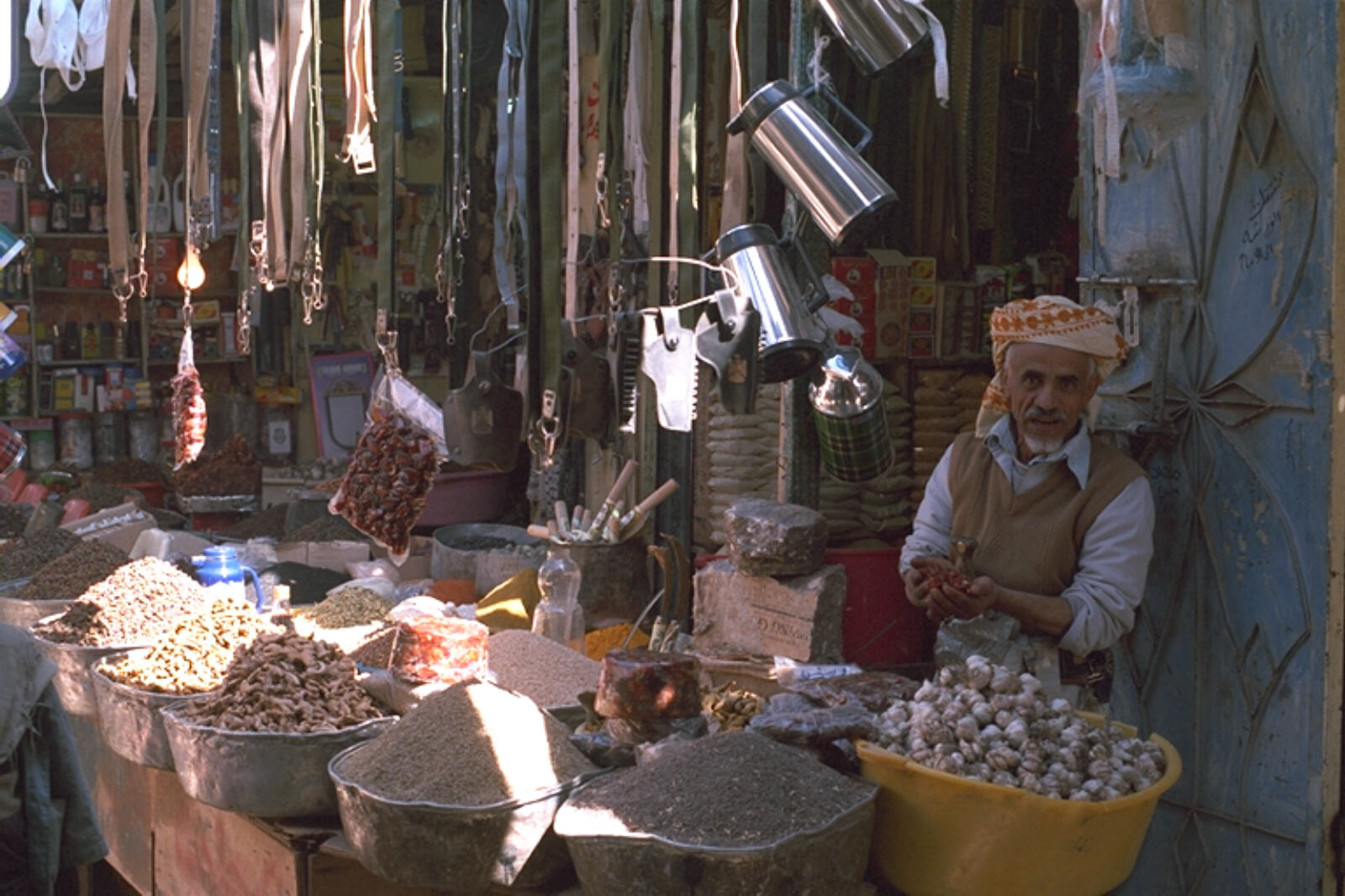
|
|
We drove on to Sanaa. On the way we played 'photograph unusual things in the back of a Toyota pickup'. |
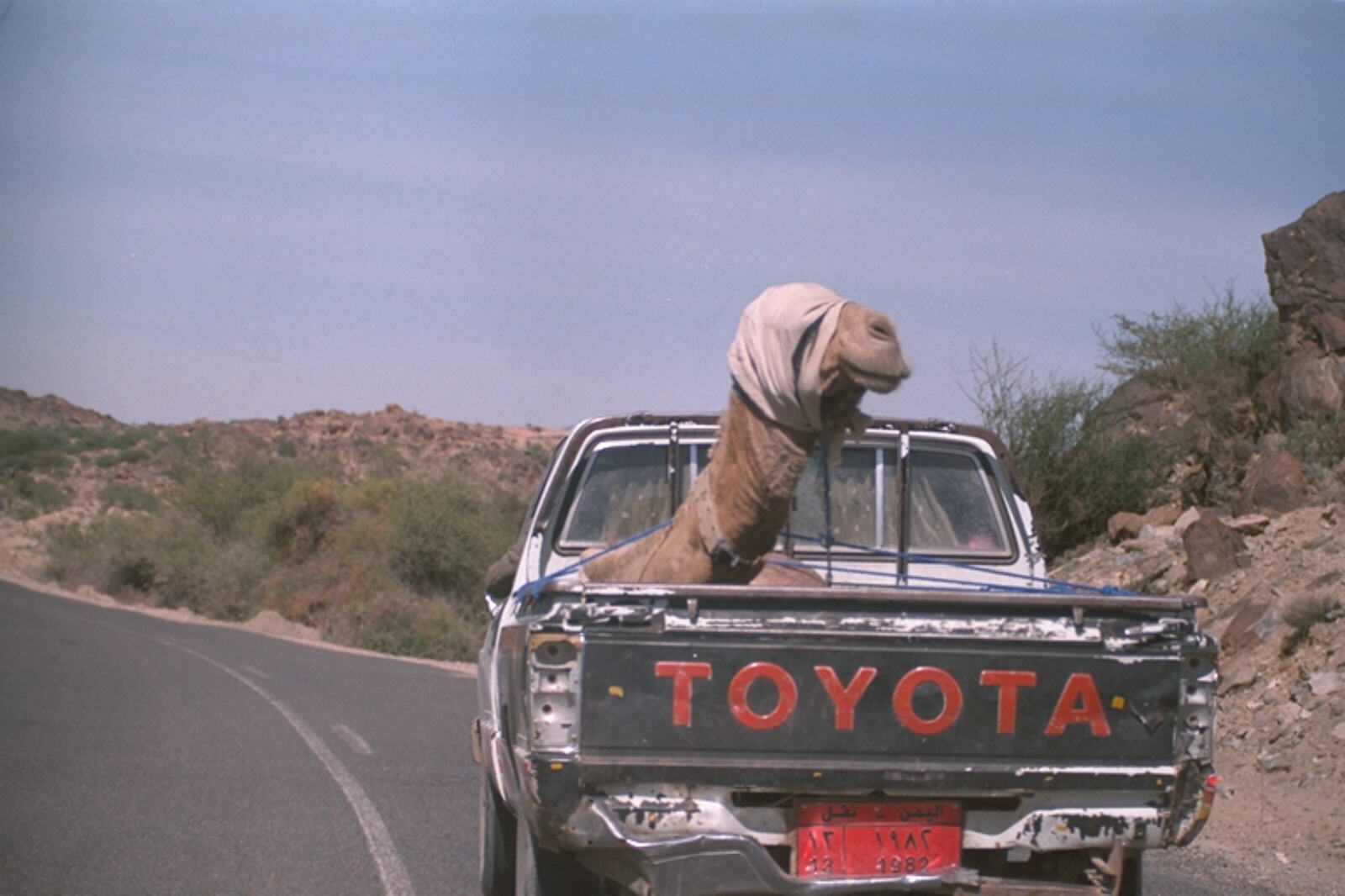
|
Part 3 - Back in Sanaa
|
We arrived back at the Old Sanaa Palace hotel at mid-afternoon and paid off Mohammed without any fuss. The hotel was really busy with Europeans of all nationalities coming and going including birdwatchers from Sweden with enormous cameras and tripods. We settled into room 204 which is huge and airy and at the back - this means there is no view and the windows are rather small but it is much, much quieter. We settled for an easy dinner at the hotel, then Zaki who works at the hotel took us out into the souk to buy frankincense and myrrh. The shopkeeper he knew, Taha, who was a very cheerful friendly man, had one of the little medicine shops with lots of drawers, jars and boxes containing all sorts of things from medicinal lizards to perfumes and potions. We bought a bag each of frankincense and myrrh for $3 each and a little tub of tiger balm ointment for 25 pence. He also gave us a small bag of musk as a present. All of them (frankincense, myrrh and musk) are small rough pebbles that don't smell of anything until you put them on the fire. We slept deeply for 8 hours despite the best attempts of the muezzin to wake us up.
Sun 30th. A lazy day in Sanaa. We had a lie-in till 6 am (well it's a lie-in to us) then breakfast at the OSP hotel. The sky was clear so it was a bit chillier than it had been before. We walked through the old city to have a look at the Golden Dar hotel, another of the old tower houses. It looked really nice but we decided not to look at a room or we might regret staying where we were. We crossed the wadi at Talha street and walked up the gold souk to Tahrir Square. We walked all the way down Gamal street which is mainly a clothes souk and found an 'all black' shop where Sheila tried on the all-over black costume, and a ghutra (headdress) shop where she bought a pink one because it's her favourite colour. Back to Central Bank corner and we stopped at the café by the city wall for a fresh lime juice. Back at the hotel we ordered a cheese salad sandwich and a pot of tea and had lunch up at the mafradj on the top floor and a sunbathe on the roof. Then Sheila had a nap and I whiled away the afternoon reading in the light, airy mafradj. One or two people came and went, apparently our mafradj is part of the Sanaa walking tour. I'm sure one of the photos in the Lonely Planet travel guide is taken from the window. We set off for another walkabout at about 4 pm, and with the aid of a new detailed map we negotiated the ins and outs of the central souk, finding our way to khans and corners that other tourists don't reach. |
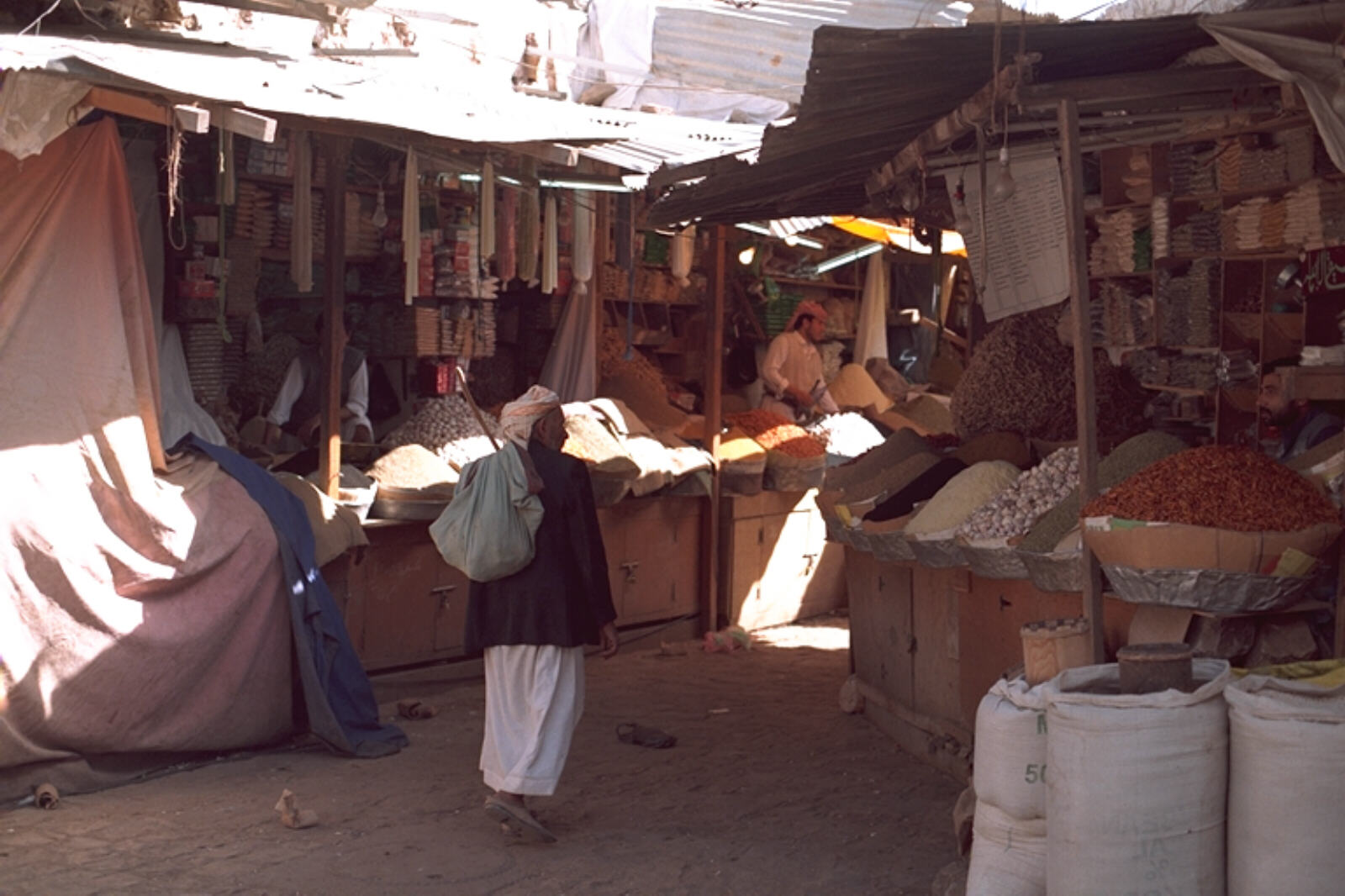
|
|
Down the ghat souk we came across Taha and his shop where we bought the frankincense yesterday, and we sat and had a tea with him. It was getting chilly so we returned to the hotel for a long-sleeved shirt and went down to the souk at Bab al Yaman (one of the main city gates). |
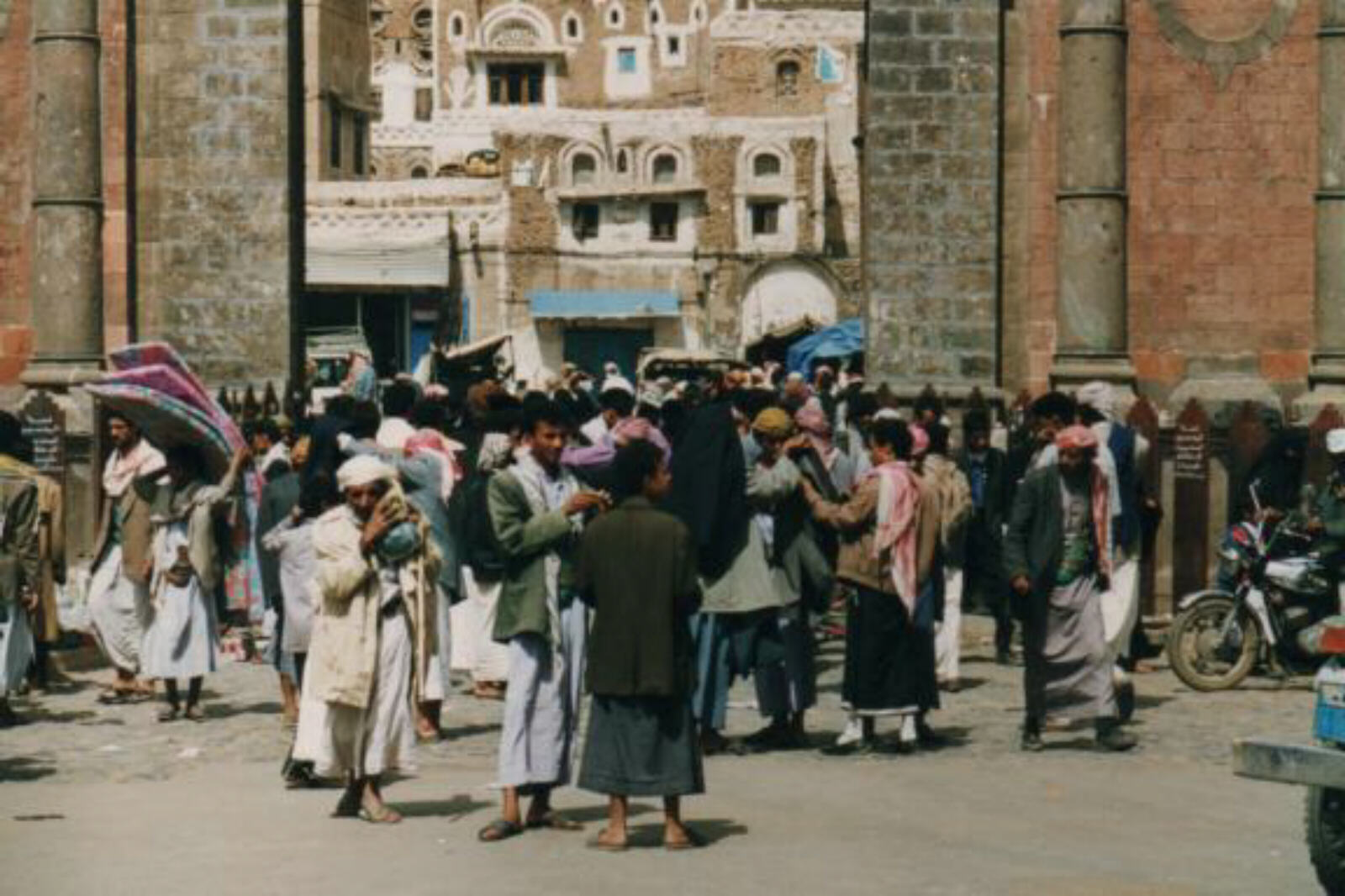
|
|
Just outside the gate we noticed a first-floor teashop and had a tea with a balcony view of all the street trading, food stalls and general comings and goings below. |
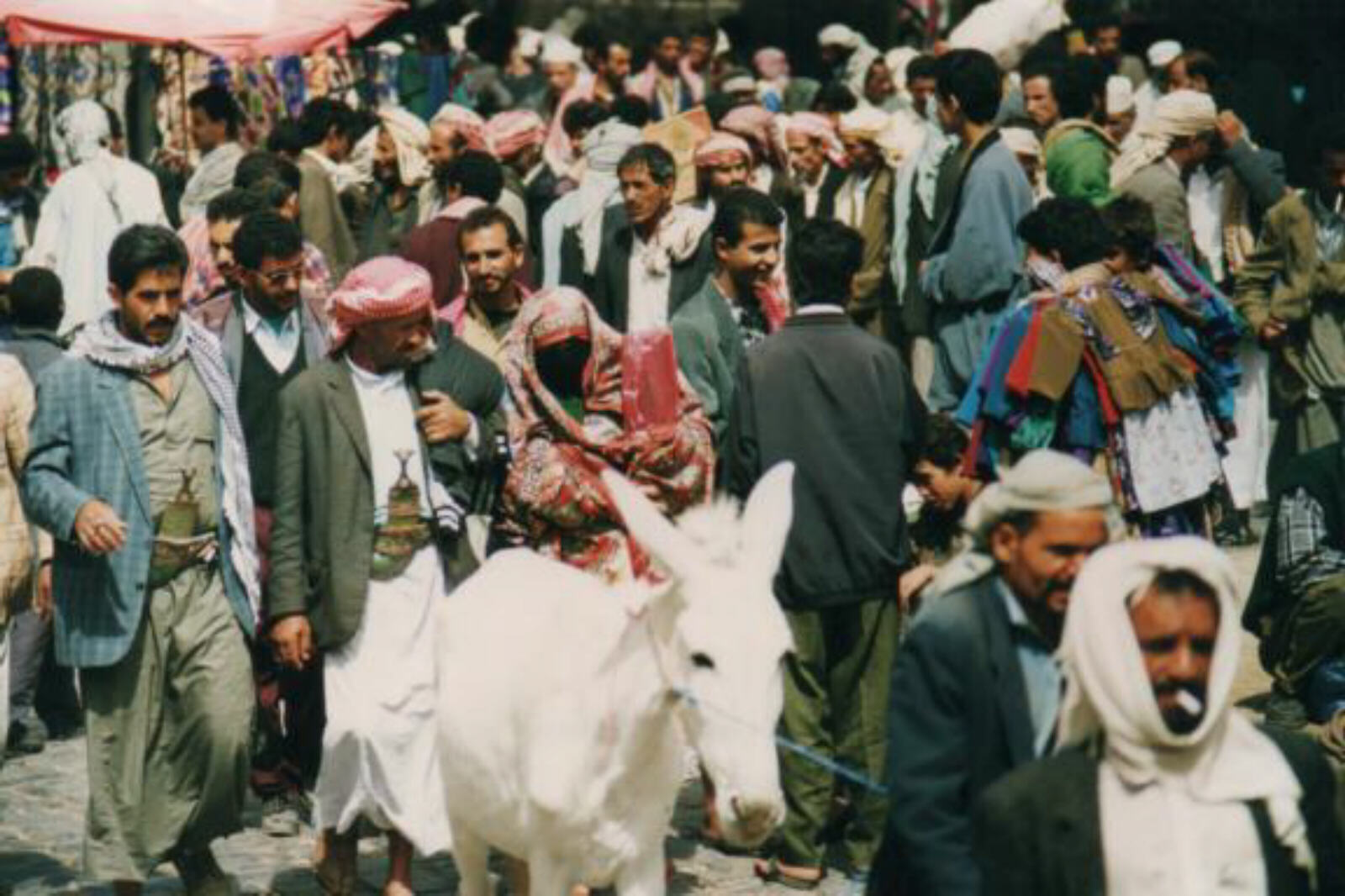
|
The tea shop was also a Yemeni hotel - one large room (with no curtains at the windows) where men were sitting around chewing ghat and watching TV, with a pile of mattresses in the corner which were presumably spread out on the floor later. We had a starter of roasted beans from a nearby stall, a glass of lime juice at the hubble bubble cafe on the way and a main course of roasted chicken and chips at the Shazarwan restaurant again. On the way back we found a real (if small) department store so Sheila checked out the perfumes and so on but luckily didn't buy anything. Finished up with a quarter kilo slab of very nice gooey sticky sweet stuff from a Yemeni sweetshop on the way back.
Mon 1 December. Another lazy day in Sanaa taking photos. Up to the top of the Art Gallery for an aerial view, then through the souk and out past the citadel to the animal market. We were a little concerned about how the people there would react but every time we as much as raised the camera we were mobbed by people demanding that we photograph them and their animals. When we finally tore ourselves away we were shepherded back to Bab al Yaman by a very nice lad wearing ten jackets. He was one of the jacket sellers in the market, who sell suits without trousers for people to wear over their thobes. Had a tea on the first floor balcony overlooking all the street sellers outside the Bab, taking hours of film and countless photos. Then back to the OSP for the same routine as yesterday; lunch up in the mafradj, a sunbathe and a read or nap. About 5 o'clock we set out again for a stroll through the souk and down to the lime juice café. On the way we met two lads, Samir and Ali, who we had met at the café yesterday. They attached themselves to us like limpets because they wanted to practice their English, so we gave in and all went to the Al Sham Lebanese restaurant on Zubirie street and bought them a nice but slightly expensive (by local standards) shawarma. We exchanged telephone numbers, bought them one cigarette each at a street barrow (that was all they wanted) and then parted company.
Tue 2nd. Went for a last walk round the souk and a chat with Taha, via a couple of passers-by who spoke English and ended up more or less asking if they could come and live with us to practice their English. Had a last sunbathe on the roof, failed to have a shower because the water was off, then Mohammed was here to take us to the airport. We scraped together nearly enough riyals for the taxi fare, but he gave us 100 back for a Pepsi in the airport. We spent the YR100 on a packet of MnMs and a cup of tea and flew back to Damascus. |
Part 4 - a stopover in Damascus, Syria
|
After customs and immigration I went to reconfirm tomorrow's flight to London and ended up in the airline manager's office. He did the usual bits and pieces on the computer and then wrote out a voucher in Arabic. Then he said someone would take us to our car. That sounded interesting - perhaps they've mistaken us for someone else and we'll get a free ride into town! We went to a Syrian Airlines car, brushing off the taxi touts as we went. I started to fasten my seat belt but the driver indicated don't bother, it's not far, and took us to the big modernish hotel just beside the airport. Playing a hunch we went up to reception and handed over the voucher that the man in the airport had written and indeed it turned out that (because the flights from Sanaa and to London don't connect) Syrian Airlines were treating us to dinner, hotel and breakfast for nothing! We phoned the Sultan hotel to cancel the reservation we made there on our way to Yemen all that time ago, had dinner of spicy dips, hamburger and chips and retired to bed after asking for extra blankets because it was getting pretty cold and the only heater in the room was a Heath Robinson contraption with an electrical coil and a beaten up reflector plate which warmed up to 6 inches in front of it.
Wed 3rd. Had our all-included breakfast and set out to get the airport bus into Damascus. As we reached the road at the entrance to the hotel a blue and white bus was just approaching so we flagged it down and it took us right into the centre of town, just a couple of blocks from the Sultan hotel. We went and said hello to the people at the Sultan and apologised for cancelling yesterday but it wasn't a problem. We set off for a last walk round the souk, buying Sheila an arabic watch on the way and stopping for a Turkish coffee at a little stall in the market and an Arabic coffee and a sticky bun in the square outside the Ommayid Mosque. We walked back along other souks we hadn't explored before, inspecting coffee beans and tacky Christmas decorations which had appeared since we were here two weeks ago. Walked back to the Sultan hotel and collected the bottle of Arak that we left with them for safe keeping all that time ago before we went to the Yemen. Round to the airport bus stop to find that one was just leaving, so we jumped on after buying a ticket from the ticket seller by the bus stop (10 Syrian, about 14 pence each). Had a rattly ride back to the hotel at about 12:30, where they said it was too early for the car to the airport so we sat and had a coffee and watched Arabic daytime television. The airport terminal is only a couple of hundred yards away and we could have walked it, but we were feeling lazy. Eventually the car came and drove us to the terminal - it was so close that he didn't even bother to cross to the right side of the dual carriageway! We flew to London.
|
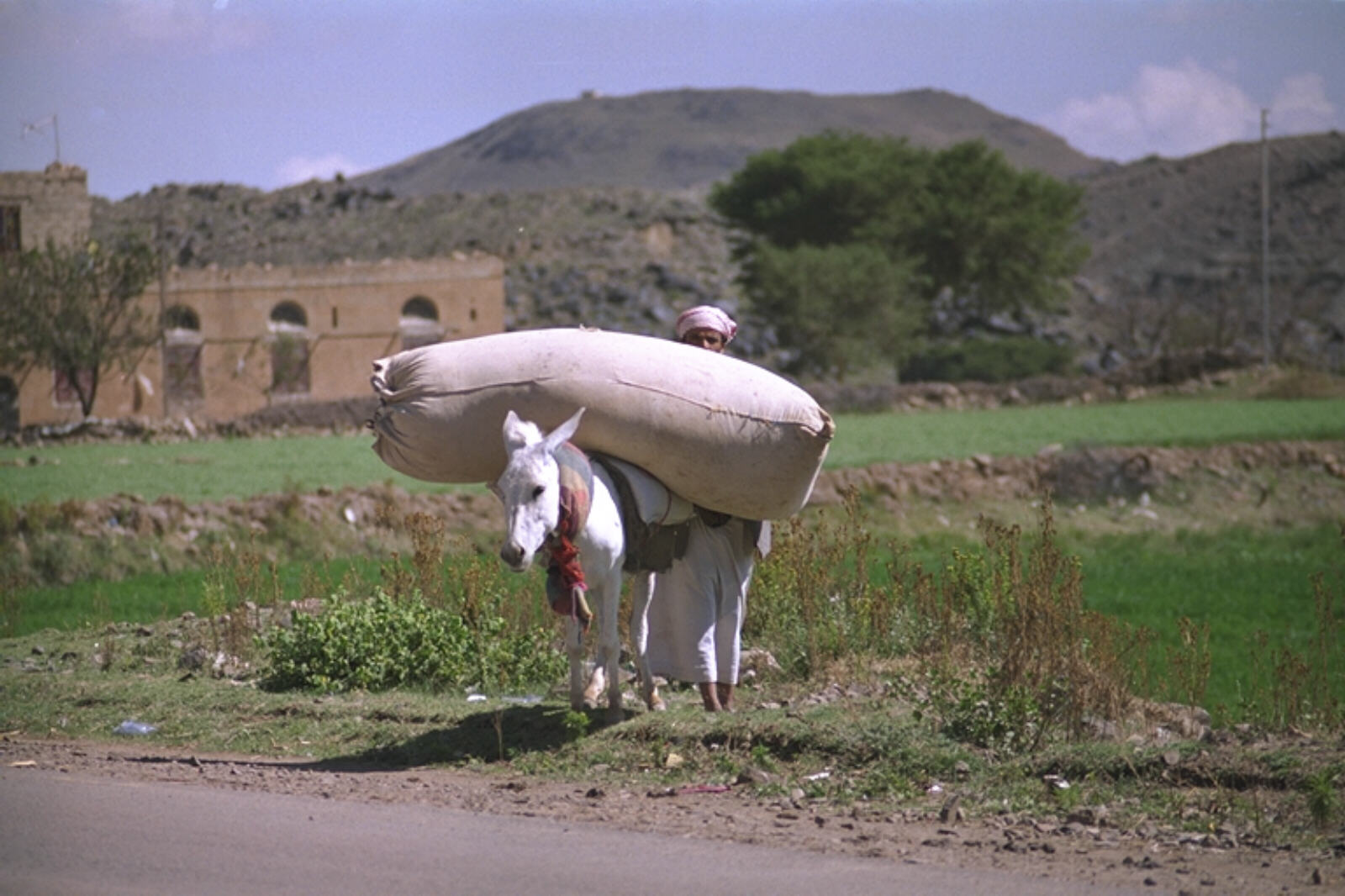
|
If you would like to see more of our travels just click the map.
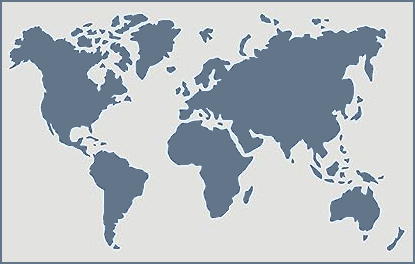
|
|